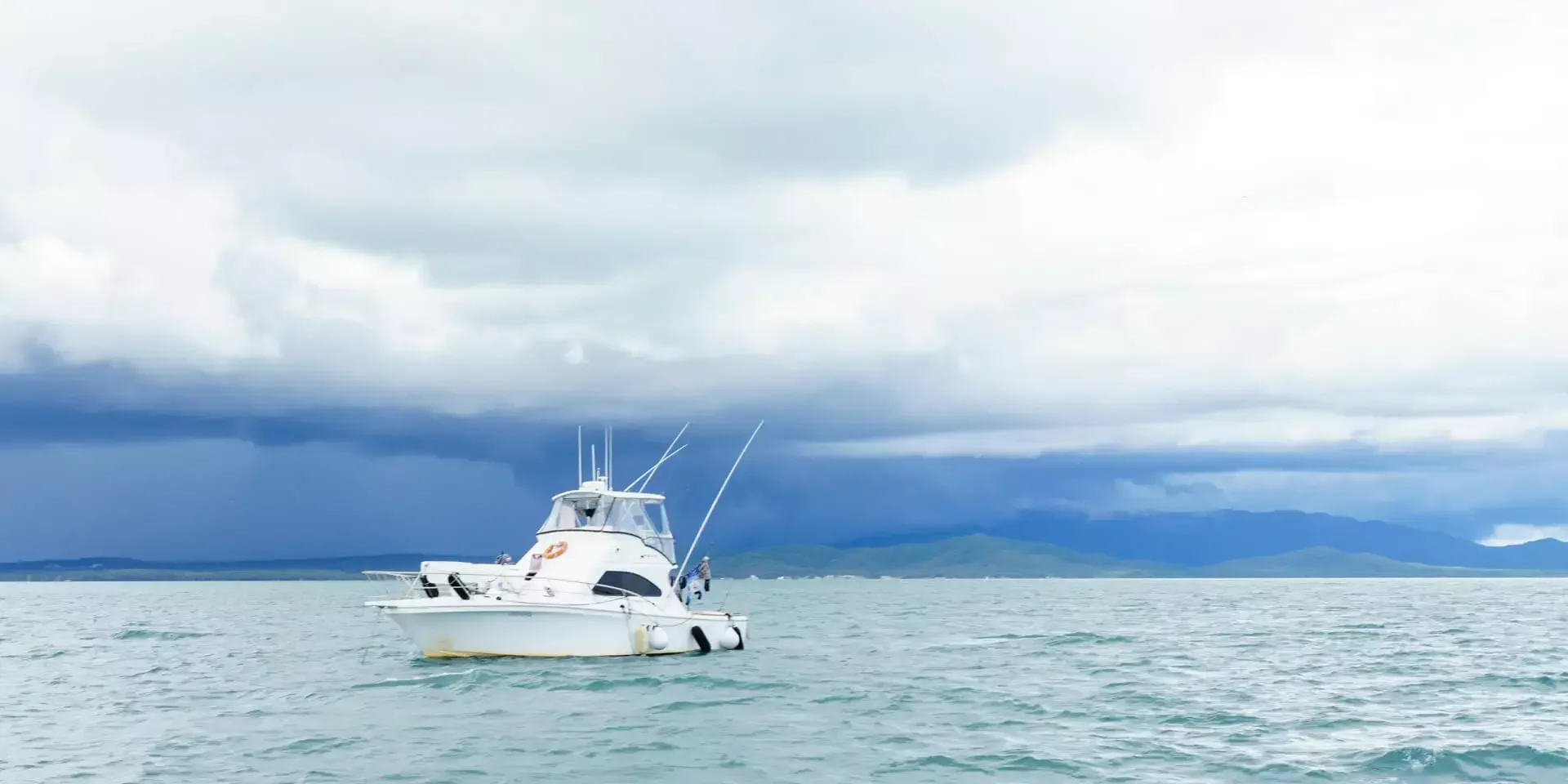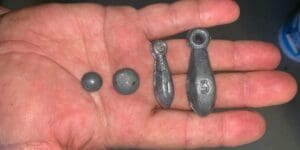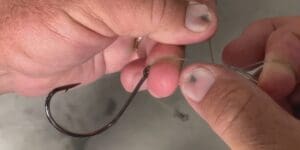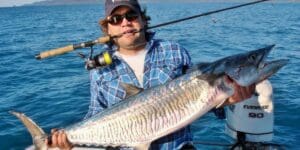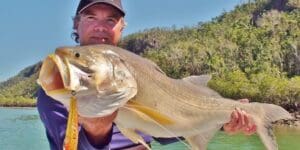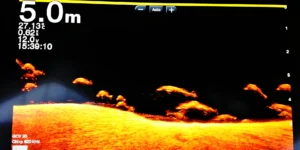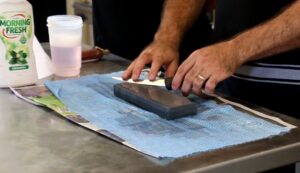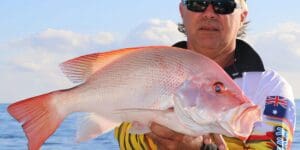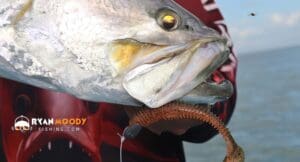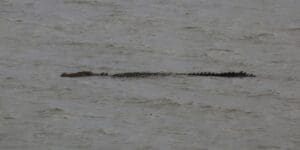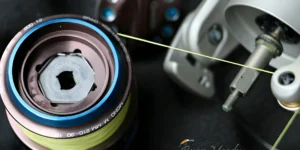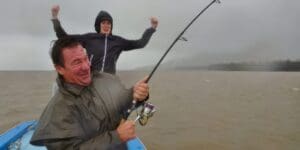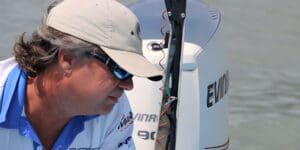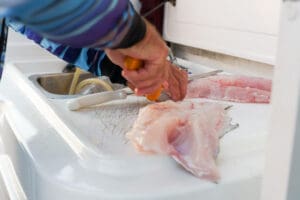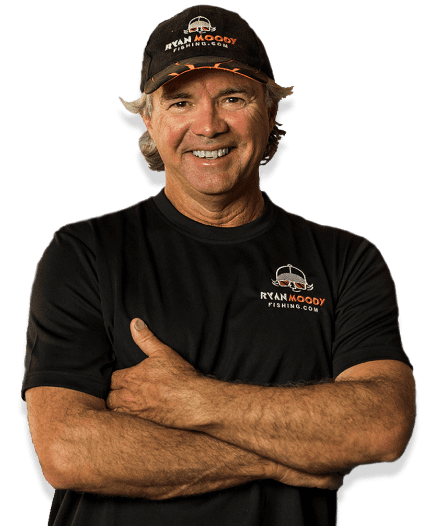Last week on our return to Cairns from holidays, we were caught unawares by an electrical storm at sea.
One minute it was just wind and rain, and we felt pretty safe in our Black Watch 40, Mood
Swings.
Nek Minit – lightning flashed all around.
To make it worse, the clear zipper ripped and we were soaking wet and standing in 2 cm of sloshing water.
All of a sudden it was no laughing matter.
And when the wife asked me, “Do we have lightning protection on the boat?” I had no answer.
As a result of our rather harrowing experience, we decided to look into best practice when caught in lightning
storm at sea.
Although the VERY best practice is not to get caught in the first place.
But we all know that weather forecasts are just that… Forecasts. And many variables come into play and they often get it WRONG.
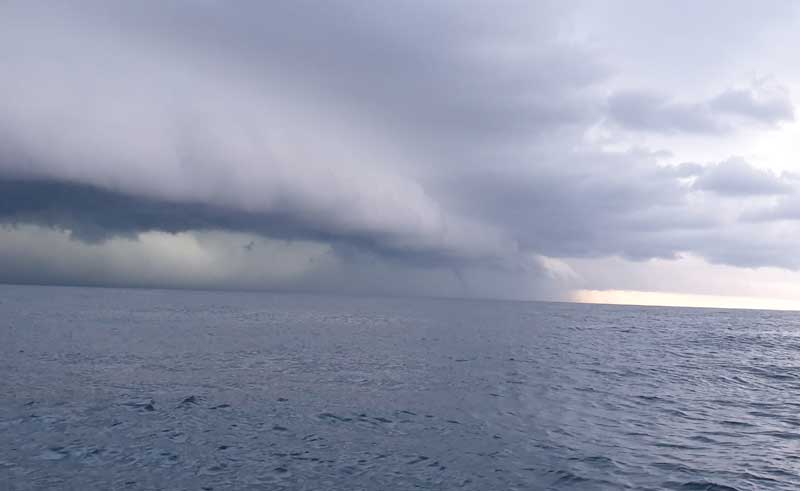
Falls
We also requested community members send us their stories so we could learn from any mistakes (a rising tide lifts all boats). A ton of members sent along their accounts of storms at sea. Some were actually fatal and our hearts go out to those affected.
In some cases, really simple mistakes caused big trouble during the storm. In others, even the best preparations were not enough.
Thanks to everyone who sent along an account. Your experiences are a valuable teaching tool for other readers.
These stories make for great reading are reprinted here;
► Swamped at sea
“She’ll be right” attitude to an approaching storm front was nearly fatal as these fishing friends were swamped at sea with non-operational bilge pumps…” Aaron Falls► My day at sea when the motor stopped.
“The snapper were on the bite on a beautiful New Zealand morning, but all was not well as the wind picked up and the motor failed to start…” Malcolm Lochead► Washed onto a breaking reef in the dead of night
“Failure of the anchor alarm meant a close brush with tragedy for these anglers, only their quick thinking skipper saved them…” Ian Williams► Saved by beginners luck from several close encounters
“Trying to impress a girl and trusting an “expert” (her Dad) was the first of several dramatic and comical mistakes made by this first time boat owner…” Allan Darwen► My passenger broke her nose
“A quiet holiday on the boat turned next level as the weather forecast got it so so wrong…” Adam McLauchlan► My brother David, lost at sea in 1984.
“An extra safety precaution turned out to be a fatal mistake leading to the loss of two young lives…” Chris Jones► My mate hid in the esky
“After trying to outrun the storm, they bunkered down, lost the motor and were rescued after setting off their second set of flares by passing commercial fishermen…” Paul Szybiak► The one third fuel rule – 1/3 out, 1/3 back, ⅓ contingency.
“In a pre-GPS white out, steering a few degrees off course left them dangerously low on fuel…” Peter Eklund► Going from good to bad in a millisecond.
“Turning to check on some smaller boats during a freak storm nearly ended in disaster as the anchor rope washed overboard and stalled the prop…” Geoffrey Ryder► Thank Goodness for self-draining decks.
“An innocent looking squall turned nasty as the wind started blowing the tops off the waves and dumping water into the boat…” Jon Snell► Maiden voyage becomes a nightmare
“With a terrified wife and two young daughters aboard, the boat started getting heavier as the bilge pump failed to cope…” John Beasy► Lighten the boat, toss the fish overboard.
“An inappropriate radio antenna and an incorrect weather forecast could have spelled disaster if not for extra fuel and a jiggler hose…” Glen Stockdale► Tsunami overturns boat and takes life
“A group of fishos hired a charter boat when a freak wave overturned their vessel and drowned one of the occupants…” Keith Palmer► When lightning strikes
“Luckily this couple were not on board when lightning struck their vessel resulting in a fireball and holes to the hull…” Glenda and Mike Brooks► Preparation prevents piss poor performance.
“If it wasn’t for this good samaritan, this family would have been swimming in croc country due to some really basic safety blunders…” Troy Moore► BOM predicted 5-10
“After whipping out the angle grinder (how’s that for preparation), catching the wife’s ankles as she goes overboard and wearing the skin off his fingers manually pumping diesel, Udo finally gets his family home safe…” Udo Hennig► Nearly killed by a peaceful whale.
“This commerical fisho survived fires, collisions, two man overboards and a sinking during his career, but his closest call came via an encounter with a whale…” Bruce Lake 20-second reads:Last year I was out fishing with a friend in his boat when a lightning storm came from nowhere. All the rods in the rocket launcher had sparks from the reel handles to the aluminium. My mate said to me, “Just get the rods down and we head in”.
I said, “No you do it.”
He said “No. Why do you not wish to touch them?”
It was simple it will blow up my pacemaker
Racing off Mooloolaba in my father’s Yacht when a storm blew in and was a bad, very bad electrical storm. The skipper [Dad] got us to drop all sails and run the anchor chain around the mast a couple of times and make sure it fully reached the water at all times. It wasn’t long after a lightning bolt hit the mast and offloaded down the chain! He said if we hadn’t done the anchor chain thing we may have blown off the mast and damaged the hull.
In 1965, between Christmas and New year I went on an overnight trip to the reef. Fishing in 20 fathoms the reds were slow. About 10.30 a storm approached. My anchor came adrift when the wind blew and I began drifting away quickly. Then my lights went out. My mate put his lights on so I could have a bearing. My compass was useless for as the lightning flashed the compass would spin. I took a guess at what I hoped would take me to shallow water. The rain was cold and felt like ice bullets. It seemed to take forever to get there. When I dropped the anchor it was in 10 feet of water! After the water was bailed out I got the lights working to signal my mate all was well. I still think I had guidance from above.
P.S. Forgot to mention, boat 15 ft motor 40hp manual pull start, no sounder, GPS or 2 way
Many years ago (in the late 1980’s) my wife and I were fishing off Lee Point, a close reef to Buffalo Creek in Darwin when a storm came thru. We were in a 4.5m Quintrex centre console. The anchor would not hold so we put a 2nd anchor out and the boat still would not hold so we started the motor and idled into the wind till the storm stopped. My wife was pretty scared and I was concerned but tried to appear non-concerned. We were only approx. one km offshore but could not see anything while the storm was on. This was before GPS technology was available to small craft so we were basically flying blind as we didn’t want to end up on the rocks.
When I was a small boy we were fishing in the parents 15ft Pride Starfire runabout with canopy. We were just offshore from the Urangan boat harbour (which was much smaller in those days to what it is today). A storm came over and one of the trawlers in the harbour overturned and the ferry that took people to Fraser Island up anchored and drifted away. It was scary and very wet for the duration of the storm.
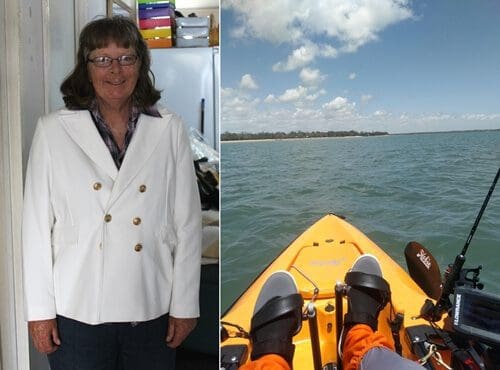
About 40 years ago I was invited to go on an overnight reef trip from Turkey Beach. It was in June. We were in an 18-foot half cab. Everything was fine until about 8 o’clock at night when we were hit by a severe electrical storm. The waves were so big that they were crashing into the windscreen, running along the canopy and dumping water onto the outboard. Arthur (the skipper) went onto the front deck and pulled up the anchor. He then started to head in towards the coast. We saw what looked like 2 trawlers and steered to go between them. Suddenly I realized it was a ship and Arthur changed course! We spent a wet, very uncomfortable night sheltering in a creek ( the rum helped) before going back out for more fishing the next morning.
We used to go to the Reef & Palms every opportunity that arose in a 5.8m. Kingston (Displacement max speed 6 knots) & our worst 2 storm events were…
- We were diving Loadstone reef for the weekend when Saturday afternoon it was like a sheet of glass but looking back to Townsville we could see a storm building. What we should have done was we should have moved to the sheltered side of the reef & anchored, but we decided to run for home, Big mistake, you don’t run from anything at 6 knots & we were heading straight to the storm. We were only about 1 hour from the reef when the wind picked up to about 25 knots. At that stage, it was no worries and kept steering to Townsville. Then the storm hit! Try watching a compass & steer when you cannot see 10m. in front. The wind was screaming & the thunder & lightning was terrifying. The boat would roll right over to one side & then get pushed sideways down the waves. Thank goodness it was a great sea boat although we thought it would tip over dozens of times. This went on for about 3 hours, then when it cleared it calmed down pretty quick. These were the days before epirbs & GPS, so if we sank we would not be missed until Sunday night, scary thought.
- We were on our way home from the reef & hit a big storm in the Kingston, I was driving & my mate was asleep in the bunks. I was beside the Island in the shipping channel when it hit, the wind was screaming & it blew up so rough & as the water was shallow all I could do is turn into the waves & hold it to about 3 knots. The waves were very close together & breaking over the top of the boat. My mate was freaking as he saw lights ahead & thought it was Horseshoe Bay but I was adamant I was beside the island in the shipping channel. When the storm settled we were 10m. from a channel marker pole. If we had hit that we would have sunk I reckon. These were terrifying storms that came so fast and blew so hard I would not wish them on anyone, I am so glad I was in a displacement boat & had years experience in rough seas in small boats.
Fishing the run-off for 4 days down the Daly River, Top End. We were sitting out the front of a creek flicking away when a massive storm brewed up and headed at us. We headed up into the creek, tied off to the bank, put bimini up and tarp over the top in preparation. The rain started bucketing down with lightning everywhere.
Due to being low on water, I decided to refill our water containers from the water running off the tarp. I was holding onto the Bimini pole and hanging the container over the back to catch the water. All of a sudden a lightning bolt has hit the other side of the narrow creek (20m wide) and has come up through the water and though my whole body. Scared the living daylights outta me. This was the end of catching water. Sat on the esky and waited it out.
It wouldn’t be boating without being caught out with changing conditions so for that reason I only take my family in our small boat out when the weather is mint. Unfortunately, I don’t get out that often but it’s better to be safe than sorry I guess.
I do however get out on the water with my local marine rescue to help some of those unfortunate or ill-prepared boaters on the water. As you can imagine many of our activations for our small brave team are when the weather is not pleasant and being caught out in changing weather conditions and storms are slowly becoming the norm😂😂😂
I had a trip recently though that was quite similar to yours where we went to assist on the water. The weather this time was great, glassed out and I probably should have shot out for a fish in my own boat. We were on the water for about 2 hrs and heading for home and got activated again so we made a detour and assisted once more. The tide was about to change and the wind picked up slightly but no big deal we had been on the water about 4 hours by this stage and headed home for the second try.
We were cruising quite well for about 1/2hr and then the storm closed in as we came back into open water, the wind picked up to 25-30kn which wasn’t supposed to happen ( BOM you really needs to get it together) and the tide was against the wind which stood the waves up to 2m as we passed through a long stretch of shoals. To say our trip back was slow would be an understatement with a number of waves crashing over the bow. No one was sick or injured but all were grateful to be back inside the harbour. Our trip was meant to be about 3hrs. Turned out to be 8hrs. It just goes to show how quickly it can change.
I didn’t get any pics as I got a face that would be better suited to radio and I was too busy holding on. Remember it’s very unforgiving out there. Stay safe👍
I own a 20ft Seafarer boat. In March last year, I was out off Edithburgh in South Australia near the Marion reef beacon. I was with two friends fishing for whiting and snapper.
The weather was average with about 0.5 to 1m seas. I decided as skipper to travel to a snapper spot and thought I would take a shortcut between the Marion reef beacon and the reef. There was plenty of water and no real swells. My mate whilst travelling made us a bowl out of a bag of salt and vinegar chips to share with us as we were moving to the drop.
Out of nowhere a swell formed, which was about 20 feet high, I was able to navigate up and down the swell relatively easily but right behind it was an even bigger swell that looked like it was going to break right on us. I remember looking to the right and left to see if I could turn away from it but decided that was too dangerous so up we went, I put a bit of throttle into it as I thought that it would break on top of us and as we reached and moved through the top of the swell/wave there was nothing on the other side so down we went with a massive crash.
I smashed my face on the metal screen putting my tooth through my lip and being concussed, my mate who had made the bowl of chips was on his back on the deck with salt and vinegar chips all over him and the floor, my other friend had fallen off the seat and was on the floor.
We were all stunned at what had happened. None of us was wearing life jackets and the situation could have been a lot different if I had made the wrong decision to turn away from the swell/wave.
Massive lesson learnt. Our wives could see the worry on our faces when we got home. We laugh about it now but it definitely was a what-if moment.
Obviously the best advice we can give you is not to get caught in these situations. But as we all know, weather
forecasts are just that…
Forecasts. And they don’t always get it right (as our storms at sea stories show).
So we have come up with some tips to consider and additional reading resources to keep you as safe as possible.
Stay safe during storms at sea with these tips.
- If the weather forecast suggests thunderstorms consider rescheduling your trip because safety must be the
priority; - When you see a storm front in the distance, head to shelter (a protected area out of the wind such as the lee of
an island or reef). Or preferably back to shore. Because many of the incidents cited above could have been avoided
had they returned immediately; - Always notify a responsible family member, coastguard or marine rescue of your destination and estimated time of
arrival. You can now do this with the Coast Guard App. Because if
the worst does happen, you’ll want someone looking for you. - Drive to the conditions. This may vary depending on the
boat. Avoid turning side on to the sea in large waves because you may get swamped.
Sometimes the long way home can be safer. - Keep a floating flashlight and batteries aboard your vessel.
Lightning strikes
- Although the odds of being struck by lightning are low, if worried you can have your vessel assessed and lightning protection installed.
- When inside an open boat, avoid touching metal objects and appliances as this can prevent electric shock. Stow
all rods and aerials, stay low and keep your arms and legs inside the vessel and try and keep everyone in the
centre of the boat; - Ensure the VHF radio is not used during an electrical storm unless it is an absolute emergency to avoid injury
in the event of a lightning strike; - Store small communication valuables such as phones, inside a microwave or even a foil twisties packet to protect them in the event of a
strike. These act as a Faraday’s
cage, hence protecting devices stored inside.
Please don’t take any chances and stay safe on the water. We recommend you use the links above to conduct some further reading to keep you as safe as you can be.
We hope you enjoyed the stories.
Neil Young
In December 2017, myself and a workmate organised a trip off Dundee in my 5.10m Quintrex Sea Spirit to get into some reds. As is customary, we checked the weather for the day and it all looked good. So we got up at sparrow fart and drove from Darwin to Dundee. Again we checked the weather and the radar was clear. We then set off on our 70km trip out to the spot. Glass off conditions made for a nice ride in the darkness, and after arriving at the spot we were straight onto some nice Nannygai.
After an hour or so and an esky full, we decided to search for some different species. We headed out a further 5km to some lumpy ground. As we pulled up we looked back towards Dundee and there was a massive storm brewing. Lightning everywhere and filled half the horizon. As with all storms, we thought we would wait and maybe watch it fizzle out or blow through.
Within the hour came the howling wind ahead of the storm blowing 100kph+ winds across the water. I said to my mate I think this is going to be big. We decided to head directly into the storm in the direction of Dundee where there was some closer in fishing grounds.

Within 30 min the seas turned to 1m and 2m then 3m then 4m. We were now down to 10kph on and off the throttle to keep straight into the waves and soften the landing. Waves were hitting us from the side as well as breaking over the front of the boat. This went on for about 3 hrs. Fuel gauge was dropping very quickly.
Here is a video we made of the trip: Battling the storm wide of Dundee
Once the seas dropped to about 1m again about 30km off Dundee we pulled up to put some more fuel in the boat and had another fish. Only a few small sharks. We then headed back in closer to Dundee and got onto some blue salmon to finish the day. While in close fishing I had a call from a mate in Darwin asking if we were OK as he saw an article that a boat had to be rescued by the Care Flight chopper when they were only 30km off Dundee and lost their navigation.

The next morning I could barely walk being battered and bruised all over and decided to crawl back into bed for the day.
It ended up being the biggest storm of the season.
Jon Snell – Cairns
I had an experience I will never forget back in Feb 2016 during the wet/storm season. Nothing special at the start weather report was good. I got up and checked the obs at Arlington. All was good and the visuals were fine other than some lightning a long way off to the south. We headed out of Cairns to Sudbury reef and the weather was good and the seas were smooth. As we passed the cay we saw that there were people who had camped there overnight and there was a gazebo they were using for shelter. We headed to our fishing spot another 5 miles on.
We fished for an hour or so and saw a small squall approaching. This didn’t look any different to ones I had been in over the years and it wasn’t even very dark or threatening. I knew we were going to get rained on and I expected the wind to increase a bit. As it approached the wind picked up and rain started. Then it got more windy and the anchor let go. It grabbed again but soon lost that hold as well. These conditions were getting pretty bad and with winds estimated at close to 30kn we decided our best option was head back to the cay.
We had the sea coming onto us quartering across our port bow. The wind continued to increase and it got so bad that when we were on top of the waves, the wind was blowing the top off and dumping huge amounts of water into the boat. Thank god for self draining decks. It’s these times you know you did the right thing by properly maintaining your boat, knowing how it all works, where things are etc. I can tell you this is the one time when I seriously considered putting on a life jacket.
We finally made it to the cay and sheltered in the lee side. The gazebo we saw on the way out was in the water and there was a lady and 2 dogs sheltering under tarp she had wrapped around herself. The squall passed and the winds started to abate. The lady called out to us and asked if we had seen another boat. I said yes there was a sail boat to the west but this was not the one she wanted to know about. She was concerned for her husband in a 6m half cab. I told her I hadn’t seen any other boats. I then got on the radio and called the coast guard. They had been talking to the husband and we were able to relay to them his wife was safe. He had taken the boat away from the cay as they were concerned it would have been swamped. The husband made his way back to the cay and when he arrived he had his life jacket on. He said that it was the most scared he had ever been at sea and his biggest fear was that the waves were going to go right over the
top of the cay where his wife was sheltering.
By this time the seas had flattened out and we headed back to our fishing spot. From start to finish it would have been only 2 hours tops but very scary. We talked about how high the winds got and we estimated 40kn ( 80kmh) this was confirmed when we later checked the obs at Arlington which got to 38kn.
Bottom line for me make sure you do your maintenance and know your boat.
Cheers,
Jon Snell – Cairns
Aaron Falls – Dundee NT
My family had organised to all fly up to darwin to spend Christmas together, the first time we 5 kids had all been in the same place since 2015 let alone meeting all the new nieces, nephews and better halves. We’ve always been a fishing family since I can remember. Growing up in central Queensland saw us 4 boys out every weekend rail, hail or shine fishing and spearing for the greater part of 20 years.
So 23rd December 2019, 6 of us (me, my brothers John, Jared and Patrick, my father in law Tony and a good mate Dave) set off from Dundee beach, at 2 am in Tonys 26ft southwind center console with a 225 suzuki pushing us along. The plan was to head 50nm out to our red marks and work our way back in fishing and diving before getting out about 2pm to beat the dropping tide.
The forecast looked good, claiming a max of 7 knots for the day and it was an uneventful 2 hr drive to the ramp which is always a blessing. Upon launching and heading through the leads we noticed several small distant patches of lightning on the horizon so we pulled up and checked the radar. Everything looked good and the small scuds seemed to be all moving away from us or well to the south. There was one storm inland and north but heading west and as they usually break up before they hit the coast we didn’t pay too much attention to it and the throttle went down again. It was a great run sitting on 26 knots with small ground swell giving the odd bump. Everyone was either asleep or too excited and the banter was flowing well. As the sky started to lighten up we stopped for a piss and noticed the storm that was north of us seemed to be closing the gap. Still not much was said about it although the subject turned to waterspouts, boats being lost at sea and struck by lightning. As the sky grew light enough to see there was some good lightning from the storms further out and to the south of us but they didn’t pose any threat and we were enjoying the show. By this time we could see the front of the large northern storm which had reached the coast and showed no signs of breaking up. By this time we were too far out to get any phone signal to check the radar to see the size of the front, but all agreed it was only going to last 20-30 min of rain. Dave laughed because he was the only one who’d packed a rain jacket and we continued on our trip.
About 6am suddenly tuna started busting up in football sized areas all around us so we took advantage and threw some slugs netting us 3 good size mac tuna as fresh bait. As we got them in the kill bin we heard a rumble of thunder and looked up to see a black wall of clouds and rain stretching roughly 100km!
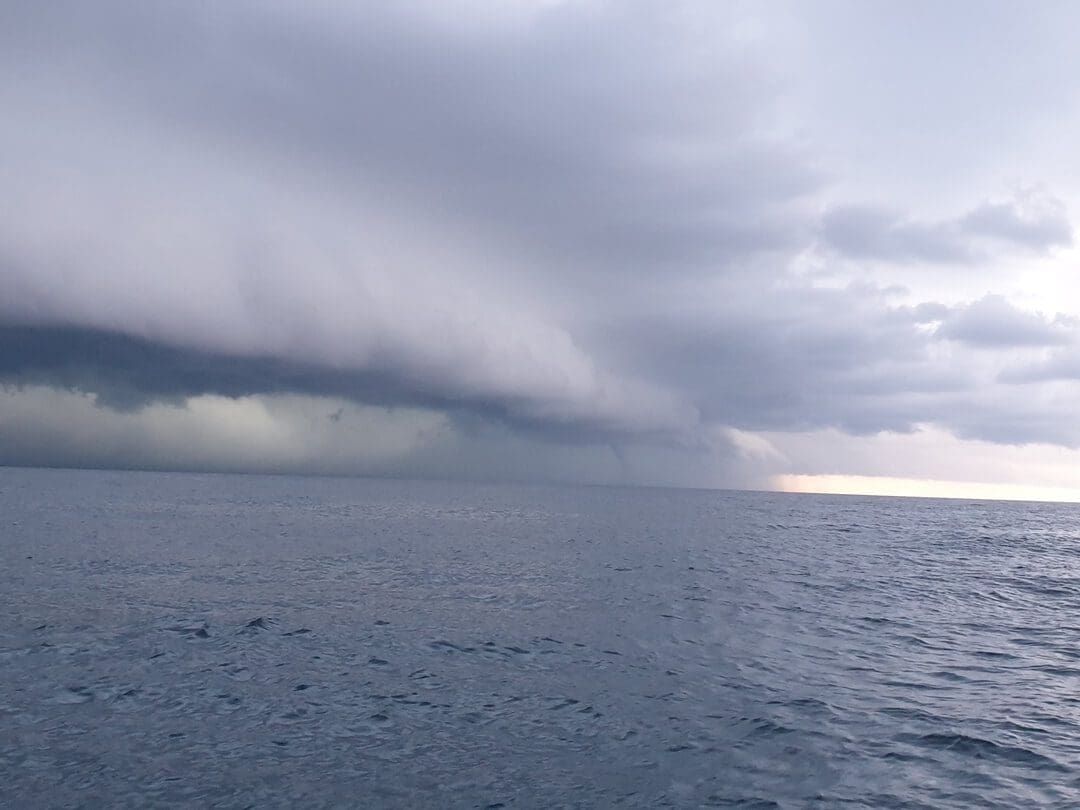
We figured we couldn’t outrun it so we may as well head for the lightest looking bit of the front still not
realizing what we were in for or how fast it was travelling. We then spotted the waterspout poking out of the
leading edge and although it was several kilometers away to the south it was thicker than a thumb. We made ready as best we could although we left the lifejackets in the nose which would prove to be a near fatal mistake for us all. The first bit of wind got to us at 6.30am and it wasn’t too bad about 30 knots. We were laughing and joking that it would all be over soon and I pulled out the gopro thinking this will be a laugh.
Not so.
The clouds dropped and started spinning 200m off our port. Tony turned outrun the forming waterspout, just as the wind that was ripping the tops off the waves hit us. Everything was screaming wind and mist. The front looked like a fog bank and when it hit us side on it all went wrong. The wind grabbed the tee top and pushed us over so far we started taking water over the side and pushing the boat sideways through the water. Everyone was yelling to Tony to get the boat straight while hanging on for dear life. He then told Jared and John to take the wheel. Jared turned full lock and John slammed the throttle down. After what seemed like forever we turned straight into the wind which was well over 50knts! This lasted about 5 minutes during which time the waves built up over 3m in height with less than a boat length between them. 2 out of 3 waves were coming aboard over the nose and being at the back i saw the entire outboard disappear underwater numerous times. With Jared on the wheel, John on the throttle and the rest of us hanging on white knuckled I yelled; “hit that bilge there’s a lot of water building up back here”, they hit the button and nothing. So I opened the rear hatch and saw the entire hull was full to the brim. I then spent the next hour and a half inside the bilge clearing leaves and bits and pieces out of the bilge to keep it operational and us afloat. Every wave that looked like it was coming over us the boys would yell a warning to me and I would brace on whatever i could and hold my breath until the scuppers had done their bit.
At nearly 9am the rain finally stopped and we found ourselves a few short miles off Point Jenny. Being that it was too rough to head back out and chase reds we settled for protected waters and a few jewies. To say the least there have been some changes to the boat since (larger bilge pumps, lifejackets and epirb relocated to the center console) and will never underestimate a wet season storm again.

John Beasy
I lived in Derby in the Kimberley WA for ten years and whilst there I bought a new boat. It was a Coralline 670 half cab with a 200 Yamaha motor. I drove to Perth to pick it up and my wife had it named Spoilt Brat with stickers on the bow to my surprise. I towed it back to Derby and decided for its maiden voyage we would go over to Valentine Island, about a 40k trip, with my wife, two young daughters and a mate. We fished the island and the creeks and, whilst in the creeks I noticed a slight breeze was coming up but was not worried.
The time came to leave the creek and head back to the Derby boat ramp, which is very exposed to the weather. It had a small creek about a 100 meters from the ramp which led to a protected ramp but was only accessible at about 3/4 tide. We left the safety of the creek only to realise the wind had come up substantially. The further we went the worse it got. By this time it was too late to turn around to seek the safety of the creek.
We were committed and it was getting worse by the minute. The shallow water in this area turning the sea into a washing machine, which large tidal flow coupled with gale force winds made this a very dangerous situation. With 2 young girls, a panicky wife, a new boat of which I did not know it’s capabilities, made it all the worse.
We were being pushed towards a shallow sandbar coming off the end of an island which we had to get around the top of. I’m trying to steer the boat sideways to the sea trying to avoid it broaching, we were being thrown around the cab all trying to hold on. We could not even get to the life jackets as they were under the passenger seats of which my wife was desperately trying to hold on to with the two girls.
I managed to steer it past the island just managing to clear the sand bars on the end of the island and then head to Derby ramp. The wind was still getting stronger, waves were crashing into the sides of the boat as well as coming over the back. We had a lot of water in the boat and the scuppers were working overtime to drain the water on the deck.
The hull was also filling with water and the bilge pump trying to cope. I could feel the boat getting heavier, but by this time we only had about 5 ks to go. I could hear the vhf radio going off but could not hear it properly due to the noise from the motor, wind, and sea crashing over us.
My wife yelled at me to call someone on the sat phone which also was under the seat but I had no chance of getting to it let alone making a call.
The sea had no pattern to it swishing like a washing machine. Just when I thought I had it figured out we would be hit by a wave on the rear quarter turning us 180 degrees and dumping a huge amount of water in the boat. This happened many times. Frightening stuff! And I was quite experienced in boats being an ex oyster farmer. But the unpredictable sea was certainly testing my boating skills, and with hysterical wife and kids on board made things a whole lot worse.
We eventually had the boat jetty and boat ramp in site but with waves crashing onto the ramp it was not an option and the back ramp had barely enough water to use it safely. So we had no choice but to attempt to enter the small entrance to the creek where the back ramp was. There was only about 300 mm of water at the entrance and with waves crashing in I hit the throttle and lined it up. Suddenly we were hit from behind by a huge wave pushing the boat sideways. I’m thinking “this is it” but hit the throttle wide open and straightened up and we launched over the bar and into the safety of the creek, to wait for more water to retrieve the boat. Well we proved the boat could handle whatever the sea could throw at it. By that time we had quite a lot of people including the sea rescue watching on.
I still have trouble getting my wife to come out on the water some ten years later. Now living in Darwin I always plan my trips better and keep a good eye on the weather.
Maiden voyage,
John Beasy
Malcolm Lochead
I went out with my friend Stanley and his friend, a doctor, in Stan’s run about. It was a nice morning at Kauwa Bay around Auckland and we set off at 6.30 am. All was going great and we dropped a set line and carried on further out once this was completed to do some rod fishing. Stan made mention that the engine was a little sluggish but thought it would clear itself with further use.
We finally got out to where we were going and commenced fishing. The snapper were on the bite and we were hauling in some really large beasts, but the wind came from nowhere and Stan decided to pull the pick and head back to retrieve the set line. When he went to start it there was nothing he did that would get the motor going.
By this time the wind was really at a scary point with water lapping over the side of the boat and it was then I heard Stan say, “guys get your life jackets on we may be going down”. All I could think of was my 3 children and that seeing them that morning may be the last time. Stan put out a series of May Day calls and the police launch DEE a DAR was just coming under the harbour bridge and could not get to us for another hour. But there was a boat coming to us from where we left that morning and it seemed like forever before we caught a glimpse of him through the spray of the wild sea. When the launch arrived he did a circle of us and proceeded to come close and throw us a tow line but once attached the slack in the line took it under our boat and when it tightened it was dragging our bow down under the water.
At last, the launch had us undertow and away we went grateful for the effort these guys had made. But the fun was not over! The dingy tied to the launch came adrift and the skipper cut power and stopped. As we had no means of control our boat slammed into the rescue boat and the bow rope guide punched a large hole in the port side of their bow, and again the tow rope had gone under the launch and was slamming us even harder against it. I then heard Stan say I have to give the engine another try and with much delight, it started. I reached over the windscreen and detached the tow line and we reversed back off the launch.
Because we were not towed back to the boat ramp we used that morning, the skipper took us to the next bay so we were at the boat ramp in the beaten up boat, but our car and trailer were still at the other boat ramp. A quick phone call to Stan’s wife and my wife and they came out, picked the car and trailer up and when they arrived Ii lost the plot and got down on my hands and knees and kissed the concrete boat ramp. WE WERE SAFE. And the fish on both the rods and the long line were so nice.
We tried to contact the guys who saved us but had no luck but they were real heroes.
Glen Stockdale – Ayr
This story is about a day that was no-contest the worst day I’ve had on the water, ever. It all started about 15
years ago when my mate Troy had just bought a 2nd hand Yalta 189 fibreglass boat and invited me to take part on the maiden voyage trip to the reef.
When I arrived the day before to help load the fuel/bait/ice etc, he said he had just bought a new VHF radio and antenna to replace the old one, as it looked pretty dodgy and he didn’t trust it. I commented that I was surprised how small the antennas were these days, as it was only about 300mm long. Troy told me that he also asked about that but the guy at the shop told him “that’s what all the reef boats are using these days, it’s just the technology has got better”. Ah well, that was good enough for me. We filled up the underfloor tank which held plenty of fuel for a day trip, but we filled an extra 20L drum “just in case” as we weren’t sure of the fuel economy of the new motor.
We checked the weather forecast on Seabreeze, cross checked with BOM and wherever else and they all said calm sea conditions until there was a strong Southerly change coming through around Sunday evening. We were planning to be home around lunch on Saturday, well before that change came through so the trip was locked in and we were good to go….
It was still dark well before sunrise on the Saturday, when I met Troy, his dad Rob, and another mate Todd as we put the boat into the water at the Ocean Creek ramp. We were all excited during the quick trip to the mouth, especially as we were greeted with beautiful calm seas. We set course for the reef and made quick time as we got to the reef in about an hour and a half and straight into the fish. As soon as VMR began operating, we did the right thing and called in to register our trip details, and destination etc. The lines went down again and the fish were on the chew, and we got a good haul of trout, red throat, a couple of nice emperor, and even a good size Spanish on the floater out the back. It was an absolute belter of a morning, we had about 20 nice fish and the weather was spectacular. “Doesn’t get any better than this!” was the common saying aboard.
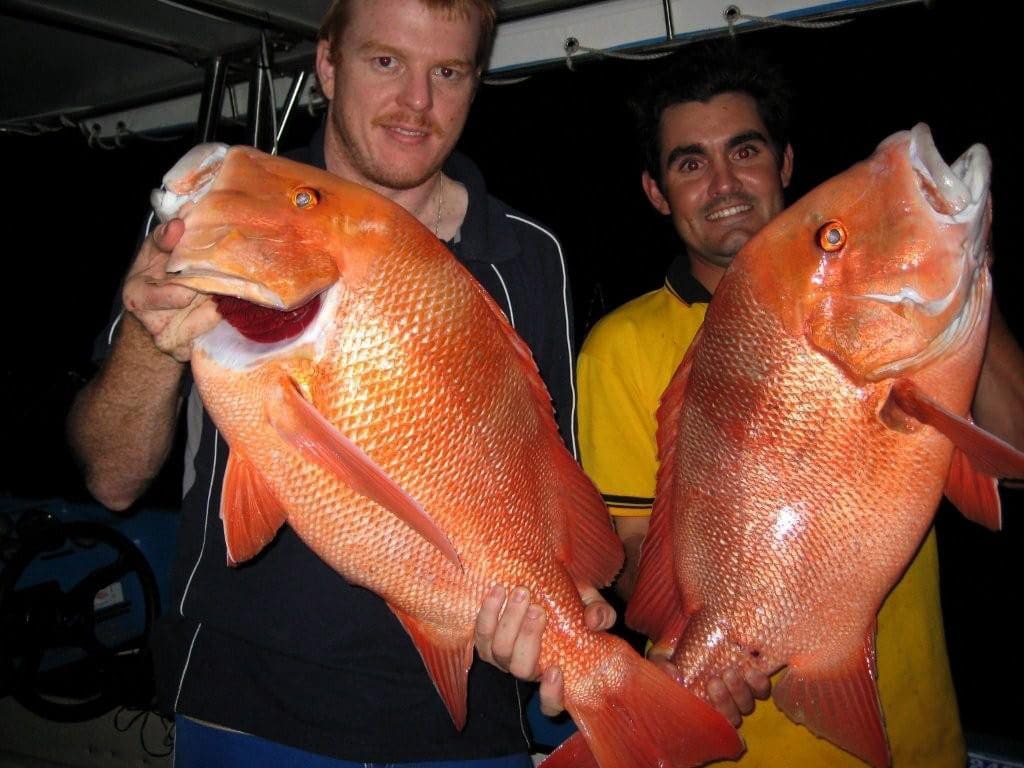
Esky full of red fish… doesn’t get any better than this.
It got to around lunch time and we decided we’d caught enough and had a good day, so it was time to go. We began cleaning up the boat and thought we’d better have a beer to toast the great day, and the new boat as we were wrapped how it performed and couldn’t have hoped for a better maiden voyage. As we were sitting back sipping on a few beers feeling pretty pleased with ourselves, we noticed a gentle cool breeze started from nowhere and quickly picked up enough to spin the boat around about 180 degrees on the anchor. We all looked at each other and all knew what each other was thinking. “Uh oh, surely this isn’t that bloody weather change already…”
Sure enough, by the time we’d pulled the anchor up to start heading back in the seas had changed from flat shiny oil to a nasty chop. We pointed the nose for home and started heading straight into much worse conditions that on the way out. The sea was going to make the trip home uncomfortable, and we soon knew the 40 mile trip home was going to take much longer than coming out, that’s for sure. As we kept going the waves kept growing bigger, and bigger, with Troy having to gun the outboard just to get up the face of the waves, then quickly back off the power as we fell down and slammed over the back. We’d all seen plenty of white caps before, but I still remember the feeling of unease when we noticed a lot of waves were actually starting to curl over greeny blue, just like the surf waves down south.
“Shit, we’re in a bit of trouble here.” We tried calling in to VMR to let them know of our predicament, but got no response. We tried again and again, but got nothing. “This isn’t good.”
We’d travelled for over an hour, rarely at planning speed for a distance of about 10 miles. We tried contacting VMR again but got no response again. For the first time in my life, we all had lifejackets out and ready, but nobody actually put one on for some reason. Maybe nobody wanted to be the first to put one on and admit the seriousness of the situation, but I’m sure we all thought the time may come that we’d need them. From such a fun trip where we all were having a ball laughing and hanging shit on each other, there wasn’t much being said now.
I think we were about half way home after about 2 hours of up and down each wave as high as the canopy, when we actually heard something on the VHF. VMR were actually calling us! We were overdue on our registered arrival time, so they were seeing how we were. We found out later that they were overrun with distress calls and checking on people as the weather change had come through so far in advance that something like 20 boats had called in distress between Bowen and Townsville that day. We called back to let them know we were travelling, slowly, but making our way in. We heard them calling something like “Mackie, Mackie, Mackie, this is VMR Burdekin, are you on channel?”. We tried again to let them know our predicament but they couldn’t hear us. “Not such a great aerial that bloke sold you Troy” was mentioned in not so polite terms.
We pushed on and noticed that we had already used way more fuel than expected and were only about half way home. We had a quick discussion and if we kept the nose pointed forward we were travelling ok, but if we ran out of fuel with the waves this big we would surely get turned side on, and most likely tipped over and end up in the water with about 20 bleeding reef fish as burley around us. It shows how serious the occasion was when the decision was made to dump the fish over the side. This would serve two purposes, significantly lighten the load by dumping the fish, ice, food etc to help save fuel, and also get rid of the potential shark attractant is we did end up getting capsized and end up in the water.
In all my life I had never realistically contemplated how bad this could get, but the shit was getting real at
this point. We opened the esky lid and threw back all of the fish we’d caught. Beautiful reef fish, trout, red
emperor, and red throat lippers all going back in the opposite direction of which they came. I can’t stress
strongly enough for anyone to think just how desperate the situation is to be forced to lighten the load to avoid being capsized 20 miles out to sea.
Whenever we have been together and told this story, the most common reaction is “I can’t believe you actually threw the fish out”. F*&! the fish, I’d do it again tomorrow if I needed to. I’d rather buy fish and chips the rest of my life than to have myself and my mates end up floating in the sea out there in those conditions.
Especially with the numbers of bloody sharks that give us a flogging every trip. That’s how serious it was. I
don’t know about the other guys as I never actually asked about it, but I covered all the bases by even sending a quick silent prayer. Anyway back to the story….
One of Troy’s neighbours knew we were out at sea, and had alerted his mum to the to the change in weather and asked if we were still out there? They had pulled the neighbours boat out into the yard to try and contact us to see how we were. As they were listening they could hear VMR calling us without response. With all the other distress calls going on, and no reply from us, they certainly started fearing the worst. Jo rang our families to let them know what was going on.
We kept nudging towards home, one big wave at a time, still trying to communicate to VMR when a crackly
transmission came though saying something about “if they haven’t heard from us in half an hour, they would be launching a rescue”. We certainly didn’t want anyone else heading out into this mess risking themselves to look for us. We were wet, uncomfortable, scared, but not needing rescue at this point. We tried telling the m but they still couldn’t hear us. We assumed that the waves were so tall that they were blocking the transmission to and from the little bloody radio antenna.
We eventually got to the point where we were very low on fuel, as we’d used so much fuel getting up and down the waves without planning properly. Lucky we brought that extra jerry can after all. Actually getting it into the main tank was not going to be fun in this huge swell. Lucky the cap for the tank was up in the cab so two of stucked up in there and got ready. We were getting tossed around as we dropped over the waves, but lucky we had a jiggler hose to help get the fuel in. Todd and I wedged ourselves in the cab to steady ourselves and poured the fuel into the main tank as best we could. It was that rough that we couldn’t help but have a bit of spillage, but luckily most of the fuel went in.
We’d been going for about three and a half hours when we finally got through to VMR. They hadn’t yet sent the rescue, so we let them know that we were OK and still on our way home. We had travelled about thirty five nautical miles in just under four hours when the seas finally began to ease. For a normal trip even this sea would have been called too rough to go out in, however after what we’d just spent so long getting thrown around in, it seemed like just a rough chop. Thank Christ for that.
While it was still rough going, we knew we were through the worst of it and the sense of relief was clear to see. There had been silence and shared worried glances for so long, but there were smiles coming out again. I think there was some mention of the radio antenna and where the salesman was going to get it lodged when we got our hands on him.
We quickly ate up the final 5 mile or so and when we got inside the protected mouth of Ocean Creek it was like we’d just won the Lotto. We pulled up in the calm water and signed off with VMR. Just a short run up the creek left to go and the gauge was showing we had very little fuel left. Maybe tossing the fish and ice was the right call after all.
As we pulled up at the ramp we had a landing party greeting us. Troy’s mum, brother, brother’s girlfriend, Todd’s wife, his mum and dad. I looked around and nobody for me! Thanks a bloody lot! When we jumped out of the boat it was such a relief to touch land again, I even kissed the ramp! I quickly rang the wife and let her know we were home, and did ask why she wasn’t there with the rest of the crew.
“When Jo rang and said how serious it was, I rang your dad to ask him what to do. He said not to worry, you guys know what to do and as long as you take it slow you’ll be alright.” I’m glad dad was so confident, as I know the rest of us weren’t. A trip that took 1 ½ hours to the reef took just over 4 hours to get home, but I guess he was right as Troy and Rob stayed calm and drove to the conditions and we eventually made it home.
Needless to say we didn’t have any fish to eat that night, but we had a good story to tell over a few beers with
our mates. Oh, and next trip I went on with Troy, he had a new 6 foot long VHF aerial hanging attached to the boat canopy and it has worked flawlessly ever since!
Lessons learnt:
- Weather forecast isn’t an exact science and they don’t always get it right
- Buy a decent aerial for your marine radio and make sure it works
- Always check in with VMR so someone knows where you are or when to come looking if things get bad enough
- Take enough fuel so that you have enough “just in case”
- Pack a jiggler hose in your boat, as you don’t want to be pouring fuel into a funnel at sea, especially if
it’s rough
Ian Williams
Three or four hours ago my mate and I got back from an overnight trip to the Great Barrier Reef aboard his boat: a 7+ metre aluminium hulled boat with a Suzuki 175 hp outboard. When we arrived back at his house we did all the necessaries to “put the boat to bed”, after which I returned to my own house and had a couple of hours sleep. I was so tired showering was the last thing on my mind, and figured it could wait until I was rested.
We had left his house at about 7am yesterday (saturday), launched and got underway by eight. The trip out to the reef was expected to take in the region of 2 ½ – 3 hours. Even though it’s “local” to us it’s still a fair stretch to get there. The GPS told us it was 135 km out, which is around 84 miles. We were heading southeast, but the closest land would still be in the region of 120 Km away.
Whilst chatting we joked about the possibility of something going wrong, and how there would be very little chance of swimming back to land what with the distance, the waves and of course the things below said waves. You know the ones I mean. Sleek shiny ones, with beady eyes and pointy teeth.
On the way out the wind picked up a little and produced a short chop which was a bit uncomfortable. The hull occasionally slammed down onto a wave producing a bone jarring smash. It’s a difficult sea to travel, and there’s not a better way to navigate: that is if you want to get there the same day.
We arrived at the reef after 3 hours or so, thankfully with the aforementioned bones still intact and functioning correctly. I can’t be more accurate with regard to time, as I’d stopped checking my watch. I was on holiday, so time was a fluid concept and of no real import.
We drifted around, getting the odd bite from Spanish Mackerel, none of which we managed to introduce to the air. We did, however, manage to acquire a few small sharks, a couple of which destined to grace my freezer. But it was time to get to the serious business of trying to bring aboard some reef fish, so we anchored and settled in for some enjoyable fishing.
I checked my overhead/multiplier reel and found that it wasn’t cooperating with my endeavours; there was no way to take it out of free spool. I wasn’t able to use it, which was frustrating to say the least. So I set up with my big fixed spool reel, 100lb braided mainline, 60 lb hook length, 6oz lead and size 4/0 hook. With some squid who had kindly donated themselves for the cause as bait, I was fishing!
They were down there! I knew it because the tip of my rod twitched tantalisingly over and over. But each twitch was followed by my motionless rod. And every fisher knows what that means: time to reel in and replace the bait.
More squid drownings followed, with repeated returning of the tackle to the sea. The twitches started again, followed by a tug on the rod tip. I struck, and found that whatever had taken the bait had managed to snag me on the reef. No amount of jerking the rod would free it, neither would a good hard tug, so I decided to pull for the break. It worked beautifully, but maybe too beautifully. Because as I was pulling there was a bang, and lo and behold, there was my reel on the deck. What the? Amazingly the aluminium casting at the foot of the reel where it sits in the reel seat had broken. Just snapped. So there I was, 2 30lb test curve rods and no reels and to make matters worse, I hadn’t caught a single reef fish. Having lived abroad I said to my mate, “if this was a lake in the UK I could pop to a local tackle shop and buy another.” But 120Km from land, that wasn’t really much of an option. The fixed spool reel was dead, totally unusable; but maybe I could tinker with something on the other reel.
I’m sure we’ve all done it; taken something apart to fix it knowing full well in the back of the mind that if it wasn’t broken before we started, it certainly would be by the time we’re done. And of course this was no exception to the rule! The side-plate of the reel departed in spectacular fashion, resulting in a scary “ping” as a couple of springs flew off, never to be seen again.
Ever the optimist, I assessed my options. All was not totally lost, as I did have a small rod and reel with me: a size 4 or 400 fixed spool that takes about 150 metres of 15lb line. So I stripped the line and spooled up with the 80lb braid from the dead multiplier. Job’s a good’un and I was fishing again with the reel attached to the reef rod. Clearly an unusual coupling, but needs must!
After having tried a few spots along the reef we had found a very nice pinnacle coming up from the bottom at about 25 metres and reaching to about 12 metres below the surface. We were sure we’d actually got the anchor hooked into the side of the pinnacle and it looked very fishy (in a good way!) on the sounder.
To be honest, I wasn’t fishing hard. I’d had a bit of a hectic, stressed week and was really happy just to be away from it all, no phone, no web and this winding down had also made me quite drowsy. Added to the brilliant sunshine I was content to do not a lot.
A couple of small coral trout, fusiliers and cod came my way as well as more nuisance sharks.
My mate was putting in the effort and was rewarded with some bigger fish, although no reef monsters were keen to visit.
We were watching and photographing the waves breaking over the reef where it broke the surface. It was quite an amazing thing, to see surf 80 miles out from shore. As the sun started to go down we were treated to a beautiful sunset and short period of dusk before one of the most amazing skies revealed itself. There were no clouds and obviously no ambient light, just the light of the stars brilliant, framing the Southern Cross in spectacular fashion.
After my busy stressful week and some early mornings I was only fit to drop, My mate was obviously tired too, so after a bit of a natter and 10 minutes jigging for squid it was time to turn in. This was approximately 8pm.
My mate set the alarm for 3 am, and he also set the anchor alarm on the GPS so that if we were to drift or drag, the anchor alarm would start screaming at us.
With an air temperature at about thirty as well as the surrounding water at a similar temperature it’s easy to sleep on the deck on a mattress; even with the deck tossing in the wind, which if anything had picked up a little more. I took a quick look sideways to reacquaint myself with the constellation of Orion. I’d use it as my own personal position fix. If I was to wake in the night I’d know if we’d moved. With all precautions sorted, I laid down and was out like a light.
Have you ever been rudely woken up by having a bucket of water, albeit warm water thrown over you? Because that’s the best description of what befell us at around 9:30 that I can come up with. A big wave came over the stern of the boat. My first thought (albeit from a sleep-fuddled brain) was obviously unfit for publication. As I jumped up and started heading forward, my second thought made its presence felt. “This is a dry boat. In which case, why am I wet?” And more fully awake now, the third thought “and that hit us over the stern!” T his isn’t what you’d normally expect, and hugely dangerous.
Thought number three had barely been thunk, when the second wave hit us in the same manner. The boat was swamped with water and we were totally confused as it was absolutely pitch dark. The only thing that was obvious was that we had
drifted somehow onto the reef and were in the middle of the surf we’d seen and photographed earlier.
My mate, the skipper, was by now at the driving position. Much credit to him, he started the motor and threw the boat in gear. He knew instinctively that he needed to put the bow into the waves without delay. That’s when the third wave hit us abeam, sideways. The boat tilted at an absolutely impossible angle and everything in it that wasn’t bolted down made a break for the opposite, starboard side of the boat. How we didn’t capsize, only the sea and the boat will ever know. And they weren’t telling.
That was pretty much the excitement over because by the time the fourth wave arrived we were pointed into it and heading for clear water. Luckily the boat has a self draining deck, because we might not have made it otherwise. Thank goodness for modern four-stroke outboards that start at the touch of the key, unlike the old ones we’re all familiar with that needed pull after pull of the starting rope, followed by a ten minute wait to allow the flooded cylinders to recover before repeating the process. And even again if we are particularly unlucky!
We had a big esky with us. It was full of food, drink, fish and lots of ice, two gallon buckets of water to act as
chill-bricks. These buckets were frozen, as were bottles and other containers. This constituted a substantial weight, against the starboard side of the boat. Earlier in the day it had taken two of us to shift it a little, this time I did it on my own. God bless adrenaline! My mate drove us away from the reef to a spot about 24 metres deep where he stopped and we just looked at each other dumbstruck.
We recovered the anchor rope and discovered that it had parted, probably rubbed away on the submerged pinnacle. So I tied on the spare anchor and threw it overboard. Never have I been quite as concerned that one of my knots should hold!
With our wits slowly returning, we tidied the boat, talking as we worked. We agreed that the anchor alarm obviously wasn’t loud enough, I’m half deaf these days, and we were both sleeping deeply. Looking at the GPS chart we had been washed onto the green area, the area that dries at low water. How lucky were we to have had a high tide!
I’ve a suggestion for GPS manufacturers. They need to incorporate the facility to plug in a klaxon. If the anchor alarm isn’t loud enough to wake the dead, then “dead” is what those relying on it could be.
We pointed out to each other that had we struck, we’d have had no time to radio a mayday: no time to grab a life jacket and no time to set off the distress beacon. We also noted that in the surf we’d have been washed onto the rocks, and there’s where we would have stayed. Neither of us could have been able to swim against the surf. We would have just disappeared and maybe in a few days the authorities would find a few bits of floating wreckage. Of course, even with a rescue effort, we’d be long gone by the time a helicopter arrived. I thanked my pal: his quick thinking, gut reaction
and sheer bloody luck saved us.
Even though we were sure the second anchor was holding, we thought it politic to keep a watch. We took turns until I woke at 6.30am, with my mate concerned that the motor oil warning light was on.
By now the sea was like a millpond, so we removed the engine cowling and checked the oil level on the dipstick. There was clearly plenty, and we decided that in this instance infallible olde-world technology( I.e. a dipstick) was more reliable than modern electrical technology that had taken a bath in salt water. We also agreed that discretion being the better part of valour, now that it was light we should make for home. The shore was 146 km away. That’s nearly one hundred miles. Running true to form, the anchor was stuck fast. We cut the rope and headed back to shore. Thankfully the 2.5 hour trip was completed uneventfully, getting us back around 9:15am.
I might be going out again next weekend, after I’ve bought some new reels of course!
They say the sea is mistress to many, but has no master. Didn’t we prove that to be correct?
Keith Palmer
In 1975 a group of us fishos (from Shortland Hotel Fishing Club) hired a charter boat to go off Swansea /
Newcastle for the day where tragedy occurred as per the attached Newspaper clipping.
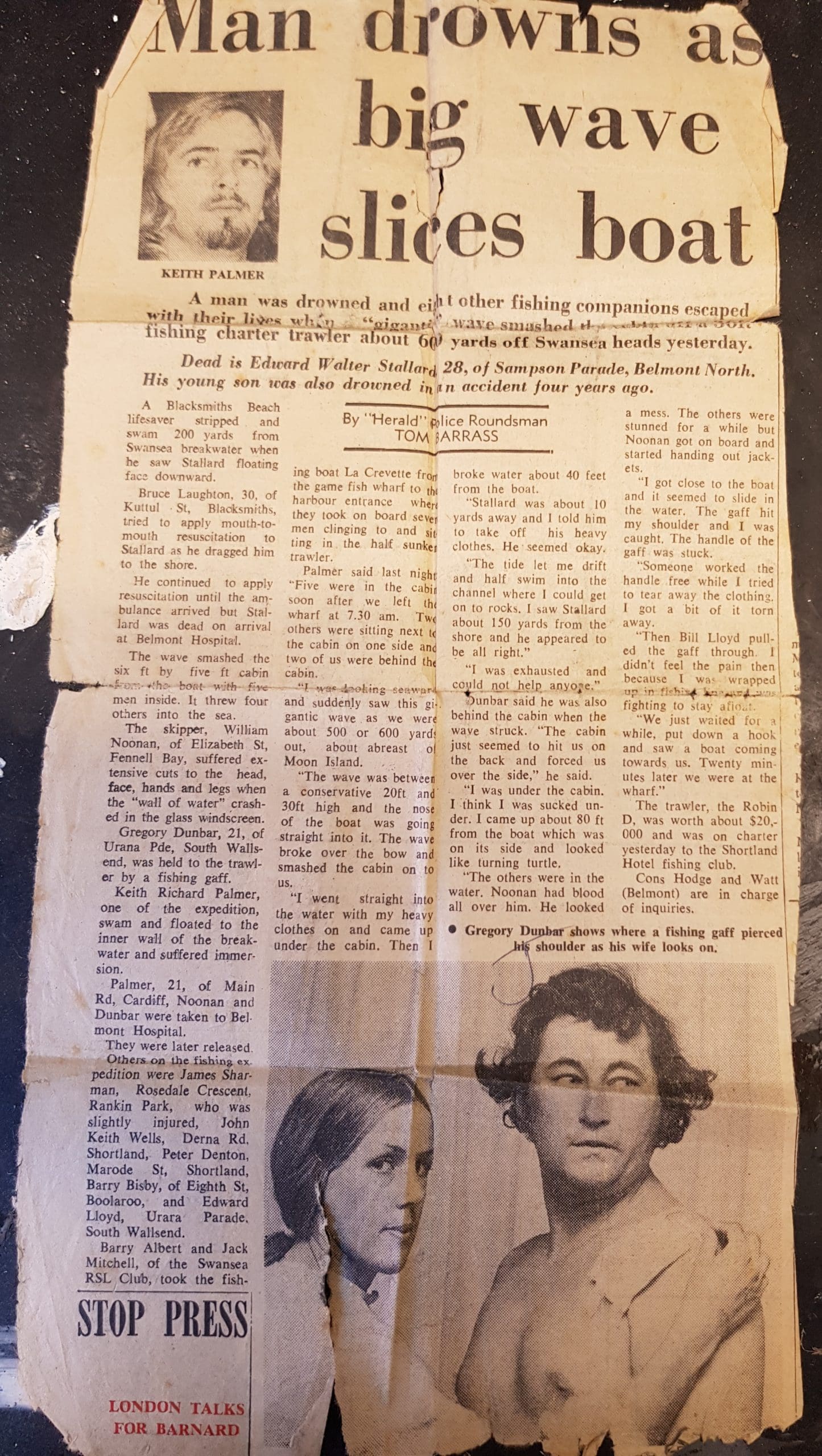
After inquests into the tragedy and all was finished, 3 years later, through independent sources, it was revealed an under ocean earth quake over the ditch (NZ) was the cause. In the same quake, 9 people were lost to the ocean in 3 days up the east coast from Mallacoota (Vic) to Mackay (Qld).
Now I’m 67 years old and still love adventure. I previously purchased your Sounder Skills 1 and am looking forward to acquiring Sounder Skills 2.
Allan Darwen – Ayr, Qld
Back in 2003 I had not long moved to Ayr running the family Pub. I had met a pretty cool chick, and her Dad
was a “pro fisherman” that had a hut down at one of the creeks.
Then I saw it.. a 17 foot fibro centre console with a 115 Johnno. It looked super cool with “Let’s Go”
painted up the side. It should be just the thing I need…
Anyway we got the boat and cruise out heading for the reef, me thinking old mate (the girl’s dad) knew what
he was doing. I didn’t even have a boat licence then, and holy shit it was rough…
But we kept going. Me, my brother, 2 girls and the girls dad. Eventually we ended up aborting the reef trip
and just went around the spit into cape bowling green to get out of the weather..
We waited a while then decided to head back around, I reckon it was worse…
About 500 meters from the end of the spit a big wave hits us from behind and the motor dies and after a
while of trying to get it running, I discovered the radio doesn’t work either…
So we drift a bit closer to shore, put out an anchor front and back and swim to an old hut the yachties use
to dry off and stay the night. We are so lucky it was there or it would have been a wild night on the beach.
As I am laying on this bunk I’m watching the boat’s green light come up then disappear with the waves, when
all of a sudden I am watching the red light, then no lights .. it was going to be a long walk home..
Next day we find the boat washed up on the beach half full of water and sand and no chance of getting it
back into the drink. After a while we decided to start walking home, bugger all phone reception in those
days, but my brother kept running up sand dunes to see if he could get reception. I said to the crew, I run
a pub, someone will miss me for sure, but nup.. they just thought I was out on the grog somewhere.
After about 3 hours a couple of blokes on Quads turn up, one of them gives my brother a lift back to Alva
beach to ring the old man. They then said they would go back and try to get the boat, while we kept walking.
A bit later the old man comes charging up the beach in a 6 week old Nissan Patrol with 2 other blokes and my
brother. I’m thinking bugger him, it is dam boggy up here.. but we all jump in and head back, 3 ton of truck
with 8 people in it is not good.
We come to a bit of a gutter and instead of speeding up, Dad slows up and yep, sunk to the runner boards in
thick mud.
One of the blokes says he knows a bloke with a tractor and runs off to Alva, still about 5 km away. Dad had
not even had a chance to put the high lift jack in, so no matter how much we dug with our hands it was no
good and with a 3 meter tide roaring in, I wondered if insurance would cover it.
Old mate then turns up with a old land cruiser tray back, but scared of bogging himself he won’t come close
enough. He looks around and says, “ it must be 10 years since I’ve seen a vehicle up this far, it’s still
here somewhere..” So I tie a snatch strap and a couple of ropes together and says to him, you will not
snatch this out, I just need to get pulled to the sand and I should be right, but nup off he goes full noise
and keeps breaking the ropes. I wasn’t even in the car for one attempt! Last go, if it breaks again we are
screwed, but he finally listens to me and the Nissan slides out onto the sand. I yelled at everyone to get
in and floor it, the poor truck didn’t know what hit it.
We get back to the pub, have a quick feed and stubby and go get old mates boat. A very old 16 foot open
fibro boat with a 60 yammy. The plan is to go in from the Haughton river and get to the spit through a bit
of sheltered water, but nup.. it was just as bad. I had just said to him screw this, turn around, I’ll get a
mate to back date insurance, when his daughter rang and said my boat was back at Alva Beach. I couldn’t
believe what I was hearing but was pretty happy so we turned around and tried to find the mouth of the
Haughton in the dark.
After one or two wrong creeks, we finally head back up the Haughton, and old mate is going flat out.
Unfortunately the water was lapping over the bank by then and he mistook a gap in the mangroves for the
river. Me and him were at the back, my brother and 2 other mates up the front and we hit the bank at full
noise. They get thrown on the bank and me and old mate get thrown up the nose. We all get up, stand in a
line and have a pee… then we all turn at the same time, look at the boat and piss ourselves laughing.
We eventually get back to the ramp and just as we pull up my brother dives out of the boat and comes up with
a fish, caught with his hands and says I finally caught one!!
Back to the pub to lick our wounds and have 40 beers.. Next day I went to see the bloke who bought the boat
back and asked them how they got it home. They said the tide was up so it nearly floated by itself, and once
they had it in the water it started first kick and they drove it home.
I ended up learning heaps about boats with that old thing. I completely rebuilt it, new stringers, double
fibreglass, painted up with the help from a work for the dole mob I was supervising.. and to be honest, I
probably spent more time paddling it than driving it. Once from way up Morrissies. It used about a litre per
minute but it was a bit sad to sell the old girl.
I now have a 5 meter seajay with a 90 optimax, a bit more reliable, especially with the kids…
Glenda and Mike Brooks – Weipa, QLD
This is the horror story that happened to our boat during a wild storm on the night of Feb 8th 2012 at Weipa
harbour.
Our boat which we had taken us two years to build was on a swing morning when during the night our vessel
took a lightning strike. Luckily we were not on board as a fire ball went off inside the boat with
explosions in the bathroom and several holes to the outside of the hull where the electric earthed out. We
think because of the deluge of rain it starved the fire of oxygen and didn’t burn the boat completely.
We were informed at daybreak from the Weipa tugs that our boat was listing and with the help of our son Nick
and his wife Elisa towed to the boat to shore.
Attached are some photos of the damage which were sent to the insurance assessors.
Thank goodness for insurance. The assessor claimed it was the worst case he’d seen from a lightning strike.
The vessel was written off and we were paid out within three weeks of the incident.
Regards,
Glenda and Mike Brooks
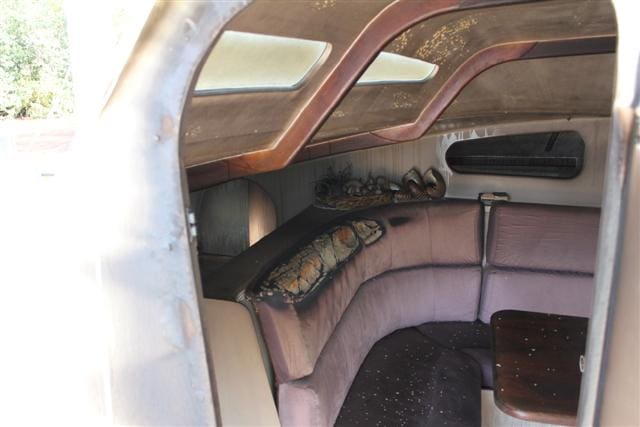
Damage to inside the vessel after the strike
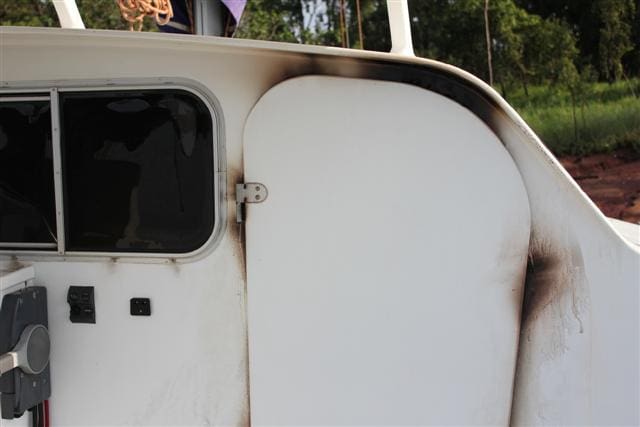
Scorch marks on the door
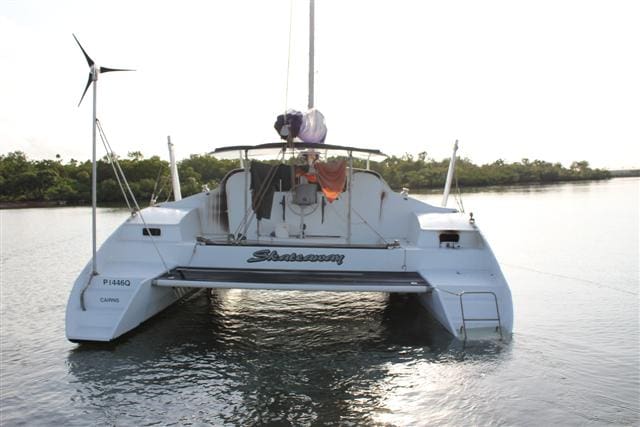
Our beautiful boat before the lightning strike
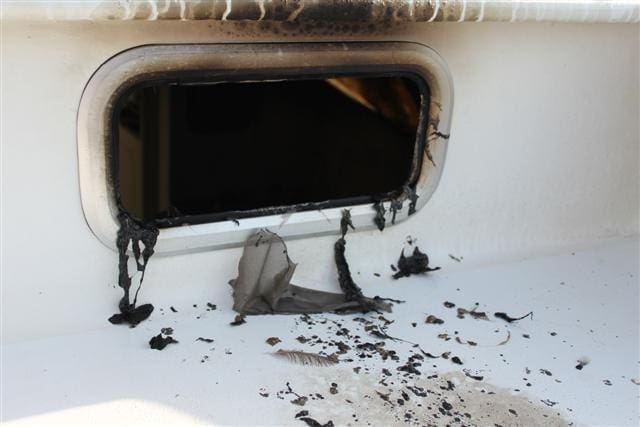
Blown out hatch – when lightning strikes a boat
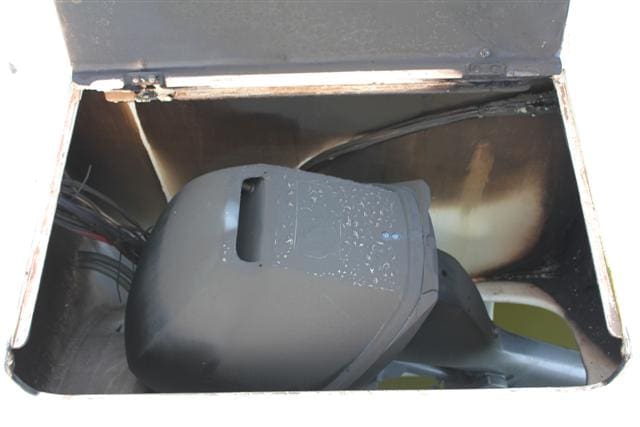
The vessel was written off after the lightning strike
Adam McLauchlan – Moreton Bay, QLD
Moreton bay is the location back in 2006. I had just bought a 28ft timber sharpie named Zetta II. She is a very
good sea boat, low centre of gravity and powered by an 80hp Perkins. I had left my harbour of Cabbage tree Creek and headed for Mud island on Boxing Day, not normally a bad time of year for storms or bad weather.
Day three of a 3 week holiday on the boat, we had spotted some weather on the horizon to the SSW over the Gold Coast hinterland. All VMR’s and Coast Guards had called the weather but then called it off during the day but we still kept an eye on it as we had northerlies of 10-15 knots. As a result, we had tucked up in tight to the coral in a nice depth of water and had the pots in chasing a nice feed of blue swimmers. We watched the front go to sea off the Gold Coast in a Northeasterly direction just on dusk. The northerlies picked up around dusk so in the anchorage, there were around 25-30 boats of all sizes 19ft to 60ft.
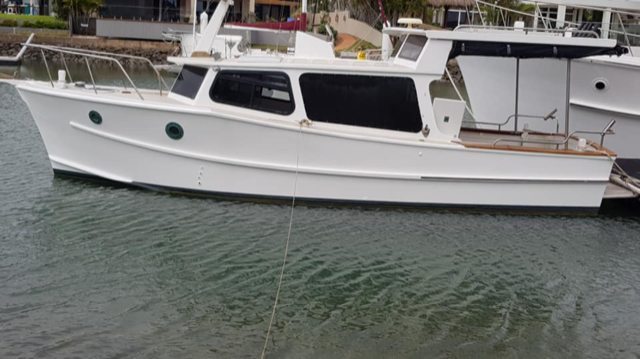
Zetta II – very good sea boat with low centre of gravity
Then around 9pm, we had heard the VHF light up with all sorts of boats in trouble to the south of us. This had the Alarm bells ringing as we didn’t have an option of going around the other side of the island due to a stiff 25-30 knot northerly. Then the lightning and the rain had started so I decided to up anchor and move off the coral ledge and head out about 500 meters off the island.
Before we knew it the front and storm were on us. I had visitors onboard and they were in a 16ft Clark and I had set their boat on the large heavy weather tow rope and my tender behind that – all on the one rope. I had
approximately 150meters of anchor rope out plus 20 meters of 8mm chain and we were copping a southerly buster of 30-35knots from the south-east. Things were not going well with the tenders getting airborne and taking on water. The anchor rope was like a piano string and I had the main engine running to engage gears periodically as we would get 3 on the nose and on the fourth wave which was around 2-3 meters and breaking would hit us side-on.
One of my passenger we’re not well with one person very seasick, hanging on to a rear stay in a chair expelling over the side. She had slipped and fallen and broke her nose. This was just another level!
I was trying to keep the boat in control and nose into the waves. This went on for about 7 hours. Just on daybreak the 60 footer was a beam of me and as he was rolling around and pitching I could see his prop coming out of the water in the troughs.
By 0700 the next morning it had turned into a glass out and we sent the injured back to Brisbane for treatment and I carried on with my trip after a big clean up. All stores ended up either on the floor or down in the hatches.
Troy Moore
Myself and a mate were anchored in the Norman River near Karumba fishing. Soon another boat came along and started fishing about a 100m from us. After a while another boat came along (the family I ended up saving).
As they arrived they accidentally ran over the other boats line and it wrapped around the prop. We sat there
watching and fishing for a while until I said to my mate “gee that boat looks like it’s taking on water.” We
watched for a couple more moments and sure as shit it was taking on water, and a lot of it, because old mate was down the back trying to untangle the line around his prop!!!
I quickly ripped in the lines and the anchor up and rushed to them. Once I got to see the amount of water in the boat I told them not to panic, the boat wouldn’t sink as it’s a center console quintrex and there full of foam under the floor. I said, “give me the little kid and mum so they are safe in my boat” and then we could help old mate.”
Once they were safe in my boat I got in the sinking boat and realized that someone had had the floor up and not screwed it back down because it was now floating, and to make it even better there was no foam under it either!!!!
To top this all off the owner had been doing some work to the boat and had taken the bilge pump out !!!!!!!!
Are you ready for the best bit ???? He also forgot to put one of the bungs in
I was trying to keep him calm and explained to him if he drives the boat straight all the water will run out of
the bung hole. But he was panicking and kept turning the boat and swamped the motor. I quickly grabbed a rope and started towing him towards the nearest creek which was 6 mile and was half able to beach it.
With all this going on I noticed in the end we had an audience. About 3 other boats pulled up and watched us, not one bastard offered help saving this family! And I think they were watching to see which one of us was going to get taken by a croc first.
Luckily another mate came past and pulled up to give me a hand. After 2hrs we were able to tow him back to the boat ramp.
The very next day I made up a backup bilge pump to keep up the front of my boat as a spare in case I have to ever save another boat and family.
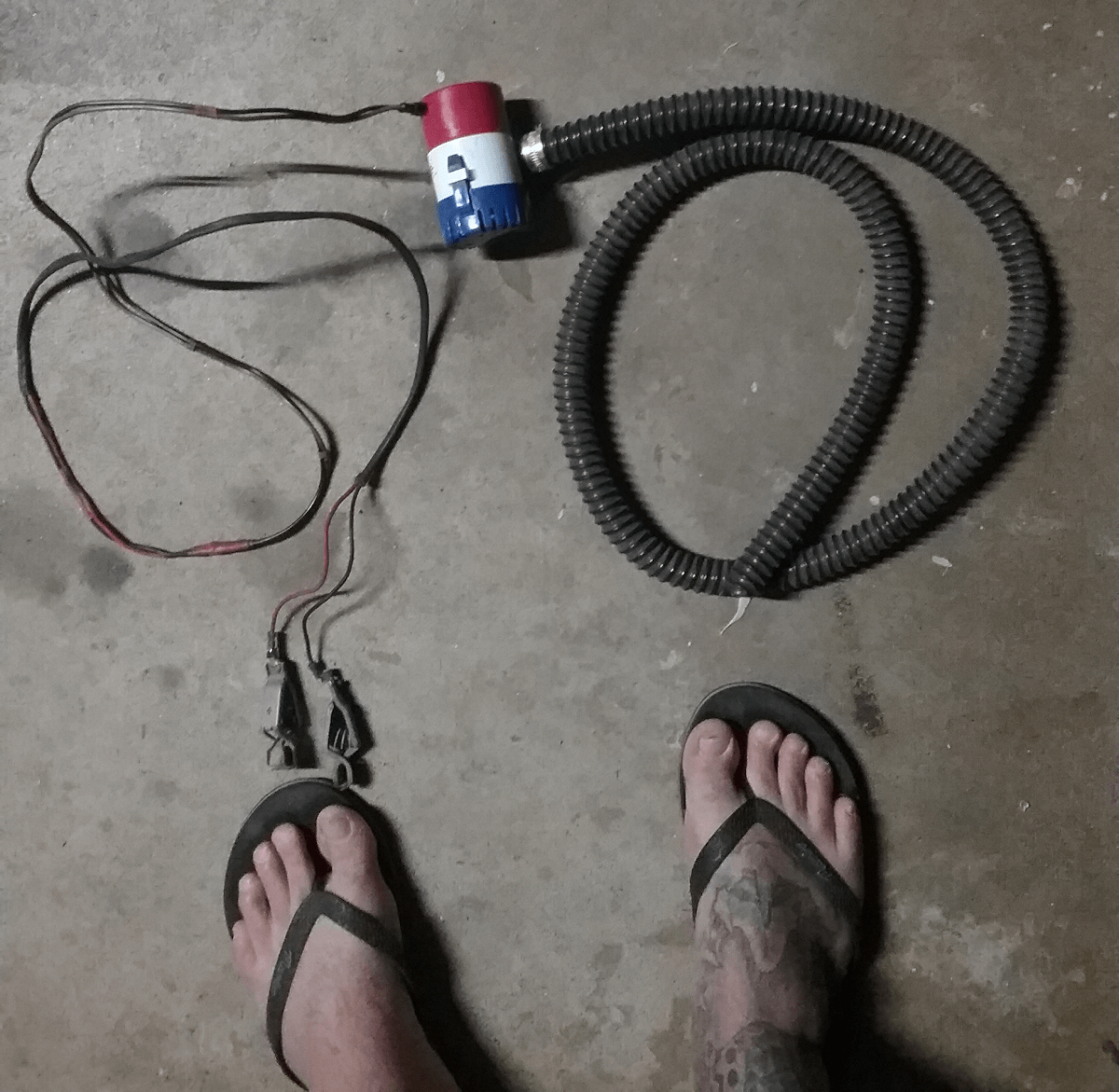
Chris Jones
The story I would like to tell, sadly had a tragic ending for those involved and their family and friends.
I think it is important to tell this story so that others can learn by what happened to them.
If someone reads this and finds themselves in a similar situation, their loss, as tragic as it was, may save
someone’s life.
This is the story as I remember it.
In the mid-1980’s, my brother David and two of his friends decided to sail a large 3 mast yacht called the Ancient Mariner, from Brisbane to Cardwell NQ. After leaving Brisbane, they found themselves at the entrance to the Great Sandy Straits, Fraser Island. They decided to wait until the morning to cross the entrance, as it was late in the afternoon and conditions were not favourable for the entrance crossing. A decision was made to anchor up and wait till the morning. When they anchored up off the south end of Fraser Island, they decided to use a forward and rear anchor to hold the yacht in position. (This was a mistake.)
Sometime during the night, unbeknownst to them, the ocean swell increased, sending an extremely large set of waves crashing into the side of the yacht. Unable to turn into the swell due to the forward and rear anchors, the yacht was capsized and sinking. They made it out of the yacht but were unable to reach the life jackets, which were inside the yacht and underwater. (No Epirbs were available in the 1980’s). They managed to make it into the tender boat, but it too was capsized, leaving the three friends alone in the water, at sea, with no help. Sadly, only one person survived. He managed to make it to shore on Fraser Island, after a swim of some 15 to 20 hrs. He raised the alarm after flagging down a passing 4×4.
A long extensive search was undertaken, but unfortunately, no other survivors were ever found.
I think several factors certainly would have contributed to this tragic loss of life.
- It is not a safe practice to anchor in open waters with both front and rear anchors. The boat needs to be
able to face bow into the waves, to avoid rolling over. - Make sure your life jackets and EPIRBS are as accessible as they can be. You never know what could happen or
when you may need them.
A memorial is now in place at the southern end of Cardwell beach for the beautiful young lady who was lost. And my
Brother David will always be missed.

Remember to be safe out there. And always have your safety gear sorted out, because at the end of the day if you
get into trouble, you only have yourself to rely on until help arrives after you’ve activated your EPIRB.
R.I.P David and Colleen.
(David Jones in photo)
(Colleen memorial)
Udo Hennig
Page back about 15 years, BOM predicted 5-10 all night and day, perfect for an overnighter in our trusted 34 foot diesel cabin cruiser. She is a GRP displacement cruiser with a single 6 L diesel donk. She can do 8 knots downhill. We headed for Keeper Reef about 70 km off Townsville, for an overnight fishing trip. Conditions were great and we arrived on dark to make anchor. I chose to anchor shallow, 10-12m, so I could dive up the plough and chain the next morning should it become entangled overnight.
I don’t do reef picks overnight.
We did some good fishing for lippers and it was time for bed, our two boys aged 9 and 11 at the time, were tired and so were my wife and I, aircon on and we were sleeping in no time……
Fast forward around midnight, I wake to the sound of heavy chain jarring and the boat heaving. The boat was rolling badly and its bow was forced under water with every heavy swell making its way past us.
slipped and slid into action. Instantly the wife was seasick, whilst I scrambled to find a solution to this pitch black mid night problem. The swells had grown to about 2 meters and the wind was howling 25kn plus.
Current, tide and ever changing wind direction had wrapped the boat and with that, the anchor chain numerous turns around a bommie, to a point where the boat was dangerously short on chain. I had had 30-40 m of heavy 10mm chain out originally and needed to cut urgently, after letting out another 20m plus a length of rope as shock absorber, to stop the boat from tearing itself apart.
Kyle my older son, then 11 years old, decided he was hungry in all that drama and microwaved himself some scrambled eggs, how is that for nerves?!!
I got the angle grinder out (yes guys, the lifesaver everybody must have on board, if you have chain only), fired the generator (no cordless in those days) and proceeded to cut the chain in the worst conditions, with sea water spraying all over me on the bow.
Finally the chain and anchor let go of us and we are free to run home, in these horrible conditions.
As I looked over my shoulder, angle grinder still in hand, I see my wife leaning so far over the gunwale (sick as), that her feet were dangling way off the deck, with most of her upper body and arms over the outside.
I raced across the slippery and wet deck and caught her by her ankles before she went over the side in the heavy beam on swell. She was so sick, that she no longer had any sense of balance or orientation. No doubt, we would have lost her in the dark of night, with the boat drifting and heaving in this heavy weather. That was way too close. Hell, it was too close !!.
But not the end of the story yet!
We are on our way now, carefully motoring at 5 knots due to the heavy conditions. Rocking and rolling. But at least onour way.
Engine stops, starter motor turning the engine, but it wont fire. Boat immediately turned beam to swell and rolled dangerously. Kyle is playing Gameboy and thinks this is fun!!!! The youngest one and his mother are not happy, with a bucket over their respective heads and under strict instruction to stay inside the cabin, whilst I am bleeding the fuel lines and filters in the engine room. I instruct the wife to press the starter button, with her head occasionally peeping out of the bucket, to see that we still had an engine that could take us home.
She fires and we are on our way, or so we thought.
5 minutes later the same thing and so it went on and on and on, an air leak, somewhere in the fuel system, but where??? Boat is taking water over the gunwales, every time the engine stops, she turns beam to and it feels like she wants to roll over in the massive white capped swells. The wife stayed put at the helm, head in bucket and I stayed put in the engine room and bleed and start and bleed and start till my thumbs had no skin left and started bleeding from pumping diesel manually (nonstop eventually) through the hot fuel pump, whilst the wife held the boat on course. We made it back into the marina the next morning after 9 hrs of limping home and berthed immediately into the first vacant berth.
Couldn’t be bothered to go to ours, that would have taken too long, ( a couple of minutes we simply didn’t have left in us ). We tied up and fell asleep where we sat and only woke up, when we were chased away by the manager, for illegally berthing in somebody else’s berth. He must have thought we were boat people.
He was briefed sternly by me and he understood.
It turned out that an invisible hairline crack had formed on one of the two fuel filter, water separator top plates. It took me a long time to find, by which time we had replaced the lot.
THANKS BOM!!
Regards,
Udo Liz Kyle and Kurt
P.S. Ryan I want to let you know that you hold a special place in my family’s history . We have just celebrated our 21th new year in Australia since leaving Cape Town, South Africa in 1999. Townsville became our new home, because of you! I stumbled across your Townsville estuary and Reef fishing charter website whilst browsing, (still in South Africa) for a destination with good fishing in Australia. . What’s the point of starting a new life when the fishing is poor ?. I had never heard of Townsville, before I got to find your web site.
One very early, dark morning in 2000, you were in the process of launching at the coast guard ramp, I saw your name and logo and I introduced myself and told you, that it was your fishing pictures, that sealed our fate, to arrive for a new life in Townsville. You might even remember. We were launching a trailer boat then. ( instead of the permitted one car, we brought the boat from SA, priorities ) Never looked back since.
I do believe you subsequently got to know our son Kyle Hennig quite well, in all matters fishing.
Paul Szybiak
Was a few years ago when myself and a mate went out for an overnighter off Dundee in the NT. It was October in the build-up and the big goldies were on fire. I have a 5.5m side console plate boat that I had just put a brand new 150 Yammy on.
As you do, I checked the weather report, perfect, loaded up and we were off to slay it. We motored about 40km down the coast and about 20km out. Night came, all was going well, few good fish and some nice eating fish in the esky when we noticed a kick-ass scud brewing up rover land and making its way out to sea. After a while we realised it was coming our way and closing in fast, the rain was dumping in this scud and the lightning was out of control.
Not wanting to be a part of it we pulled anchor and took off, but it was too late. I had the motor flat stick as
it was so calm and flat but the storm kept closing on us as we tried to outrun it, no matter which way we went we couldn’t dodge it.
In the end, we had to bunker down and ride it out and it was crazy.
My mate is shit scared of lightning which was smashing around us everywhere. He pulled the esky out of my cast deck and hid in there which pissed me off as a bit of moral support would have been nice. I decided to keep my motor running in idle and just keep an eye on the sounder, which I could hardly see through the rain. It was like being in a washing machine and we were taking waves over the side of the boat but from every angle.
Then my motor went dead, unknown to me the fuel tank breather took in enough water to get enough in the tank and kill the motor. The breather has since been modified but I swear if I did not have a sealed deck boat we would have sunk! A bilge would not of keeping up with the amount of rain and waves in the boat.
After about an hour the storm passed and I saw the cast deck lid start to open and my mates face poke out so I jumped on the lid as I was not happy with my mate.
Anyway, we tried to get the motor going but no go. We waited for the rest of the night out, had a bit of a sleep and thought we would see a boat in the morning. Morning came and nothing, nobody. So we left using the electric until the batteries went flat then anchored up.
I tried my 2 way but it wasn’t working. The week before, my mate’s kid was using the arial as a spear at home. I stopped him but didn’t realise it was damaged.
Man, it was hot, so hot, no sunscreen. As the day went on we still saw nobody and all we only had a carton of beer and a carton of Jacks, 3 litres of water and a packet of pretzels on board.
Around lunchtime we realised nobody was heading out our way, this could be serious and went into survival mode. We stopped drinking beer so we didn’t dehydrate, rationed the water and took turns with one of us sitting as a lookout with the other under the raincoats to keep the sun off.
The day passed, nobody, we were burnt, thirsty and hungry, we tried eating the pretzels then having a mouth full of water to fluff them up in our stomachs to fill us up but that didn’t work. Night came, we were getting really worried, starting to shit really and kept taking turns as lookout and sleeping.
Some time in the middle of the night my mate started going off, he thought he saw a boat. Ii got up and you
ripper, a boat. We had been dead in the water for around 30, 36 hrs now. We let the flares off but the lights on
the boat didn’t change course so we let off the old out of date flares which I keep as a backup.
The lights on the boat changed course and in about 10 minutes we had a commercial net boat sitting next to us. They didn’t see the first flares and said they only just noticed the second set because of the direction they were facing.
They gave us 2 options, wait and they would come back for us in a day or we could go fishing with them until their brine was full. We wanted off our boat so the skipper dropped his anchor and tied my boat to it as it was
obviously heaps bigger than mine. We collected our valuables, set some solar-type lifts to the boat which these guys had, pulled the batteries for the electric motor out, took a waypoint and jumped on board.
Once we were on board we used a sat phone to ring home, put my batteries on their charger and they let us have a shower, cooked us some tacos and gave us some fresh clothes and we went fishing with them.
They filled their brine that night, they said they were getting good karma for picking us up. In the morning we steamed back to my boat, sorted everything out and they towed us back to Dundee. When we got close enough to the ramp they sent us off using the electric motor to get to the ramp.
They were unloading later that day when they got back so we went home then went to the dock, helped them unload and laid massive amounts of top-shelf piss on them, they were champions.
I took my boat into the shop and ended up with a $14,000 repair { insurance } on a motor with 34hrs on it. The
saltwater had rusted the motor internals badly. I do have an EPIRB but wasn’t sure if the coast guard would have picked us up and left my boat behind which I wasn’t prepared to do.
I always carry an excess of water nowadays.
Bit of a long-winded story but a lot happened in those couple of days. A photo of my mates sunburnt legs from the trip attached. Hope you enjoyed my story more than i enjoyed that trip.

Bruce Lake – Barwon Banks Qld
I was a commercial fisherman in the 60s and 70s, mainly prawn trawlers, a very dangerous occupation in those days. I was involved in two collisions at sea, 4 or 5 fires on board, knocked overboard two times with the net, broke my back in Princess Charlotte bay with the trawler sinking in big seas. I had a rope tied to my waist, thrown overboard and pulled aboard another trawler and taken to Cooktown. But the most frightening of all was in flat calm conditions around August 2012.
I was retired and had a 30’ powercat, at anchor on the Barwon banks, at my favourite fishing spot. I had loaded the esky with an assortment of reef fish at midnight and went below for a sleep, setting the alarm on my phone for 4 am for the morning fish. At 4 am the alarm went off and I tried to change clothes but there’s not a lot of headroom so I managed to shed my pants. With my clean pants and phone in hand I stepped up to the cabin as I did I felt a hard shunt. I looked towards the stern only to see it disappear and a wall of green water coming towards me. A whale had breached under the port stern quarter and lifted the port side and as it did the starboard stern went under water.
The boat capsized trapping me inside the cabin in an air pocket. It was 4 am, in the middle of winter, pitch
black! I was trapped by the large esky which was spewing fish out of it. Thankfully I eventually made my way out of the boat on top of the water and climbed onto the upturned hull. There was only a metre of boat out of the water and because it was Monday morning after a flat calm weekend, I did not expect a boat to come by. But one did! I could see it’s nav lights first both red and green then only green then none. They didn’t see or hear me. Not long after daylight I could see another boat coming straight towards me but stopped 100 mtrs away. I was yelling as loud as I could eventually they heard me and came to my aid. They had thought some silly bugger was on a JetSki 20 miles east of Mooloolaba.
Remember I was getting changed. Well when rescued all I had on was a t-shirt. I was given a pair of track suit
pants and a towel. 3 lovely gentlemen from Brisbane had taken Monday off to go fishing. On the way they were involved in an accident with a stolen car which was being pursued by the police so they nearly didn’t get to the boat ramp let alone rescue me. The Mooloolaba coast guard were contacted and took around 3 hours to reach us. I was then transferred to the 40’ coast guard vessel and after an hour or so they were able to right the powercat and commenced towing it to mooloolaba. Not long after we started the tow I suffered a heart attack and a helicopter was dispatched. The coast guard was advised to abandon the tow and proceed on course to Mooloolaba at speed. As soon as the boat slowed to let go the tow line the cat rolled over again! Meanwhile I was lying on the wheelhouse floor in pain.
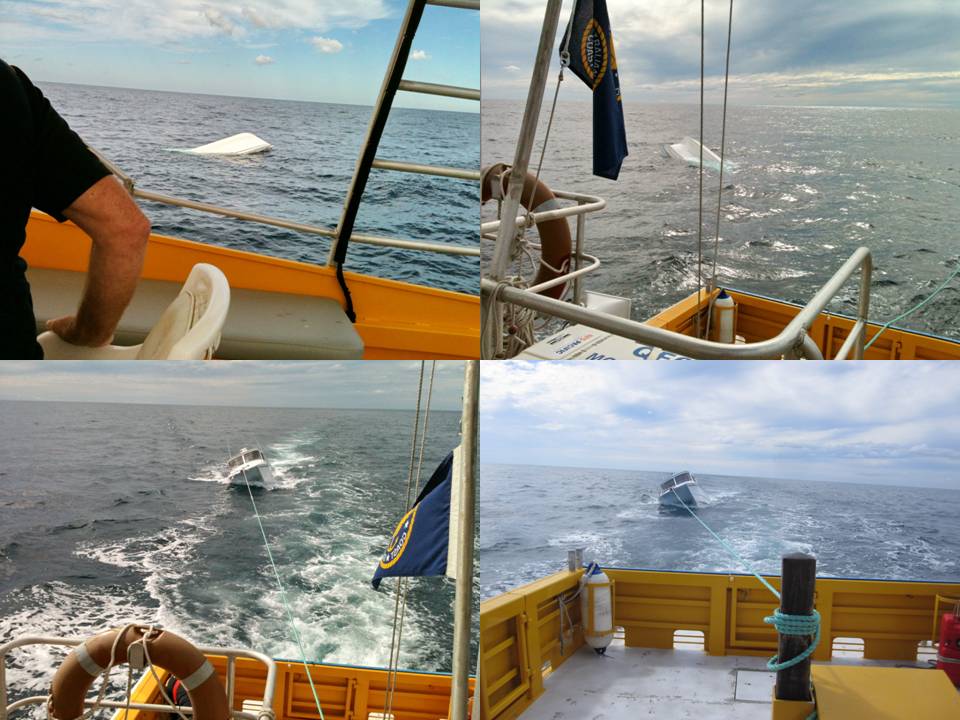
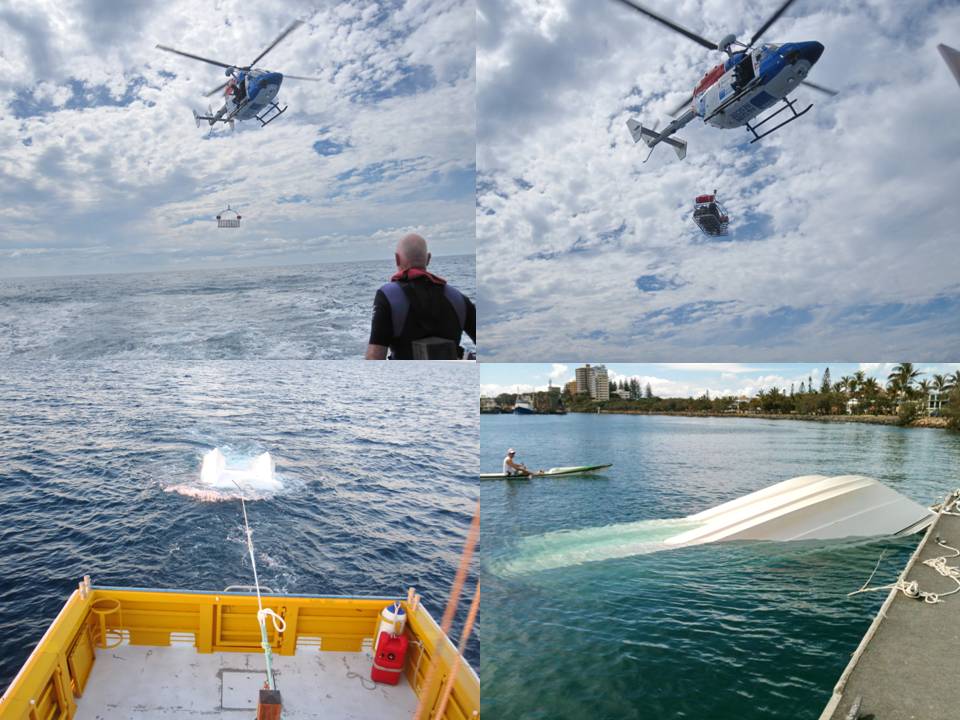
A while later the AGL helicopter was above us and a basket was lowered to the deck. The boat was underway all the time. I was placed into the basket and as I was being winched off the deck the basket slammed into the back of the boat. I was winched on board and taken to hospital.
I had a Neuro stimulation device implanted inside me for back and leg pain. So when the basket hit the boat I took a direct hit to the area of my body where the medical device was inside me. As a consequence it went berserk inside me cramping my hands legs etc. I was in Nambour hospital and they had to fly a computer control unit from Brisbane so they could turn it off, but when it arrived doctors didn’t know how to operate it as it was new technology. They eventually figured it out and turned it off. I recovered quickly and now have 3 stents in my heart. I learned later the coastguard and the AGL helicopter practised the exact scenario 1 week earlier how lucky was that?
After I recovered my family hired a large cruise boat and invited all who were involved in my rescue from the
radio operator to the boat crew and the helicopter crew and of course the 3 gentleman who found me. We all cruised the Mooloolah river, drank, ate plenty of seafood and told lies for the evening. It was great.
Moral of the story it hasn’t gotta be rough or stormy for things to go wrong on the water.
Take care!
Peter Eklund – Rockhampton, QLD
Many moons ago (about 45 years to be more precise) my elder brother purchased a 23ft V8 sterndrive Huntsman,
our previous boating experience at the time was limited to a 12ft flat bottom bond wood rig.
We were only 18 & 22 at the time and as the Thirsty Merc song goes “While you’re young, you gotta learn
the hard way, son…” Which for us, meant a lot of hard lessons!
This was back in the chart and compass days and to his credit my brother did a formal navigation course and
installed a very expensive compass in the rig. Along with a bunch of mates we regularly fished and dived
Loadstone Reef out of Townsville (you would know that one Moody), my brother’s navigation skills always put
us spot on Loadstone.
One trip a very big rain storm came in and stayed in, visibility was about 100 metres. On the return leg we
knew there was a huge rock called Magnetic Island close to our normal course so steered a few degrees south
of the normal bearing. But a few degrees is a fair navigation error over that distance. We knew the coast
was close when the storm finally lifted (to our great relief). The navigation error became apparent so a
northerly visual course was set to Townsville.
I kid you not, the very moment the boat pulled up at the Breakwater ramp the engine stopped, the fuel tank
was bone dry. Four key points came out of that day;
- How quick a nice day can turn to sh**
- The value of good navigation skills
- The one third fuel rule – 1/3 out, 1/3 back, 1/3 contingency
- Reflect and learn (and apply learnings)
These days GPS takes all the errors out, but it is vulnerable to failure of the boat’s electrical system.
Wiring quality is paramount along with battery maintenance, and I would suggest a direct lightning strike
may well fry every connected device. Chances are probably reasonably low of a total failure on any one
particular trip, but the cards will fall that way some day. Call me cautious but along with two MFD’s, two
batteries and single VHF radio I also have a totally independent satellite communications and navigation
device in the form of a Delorme inReach (now badged Garmin). The final fall back is EPIRB on the boat and
PLB on the life jacket.
Enjoy that boating passion and stay safe.
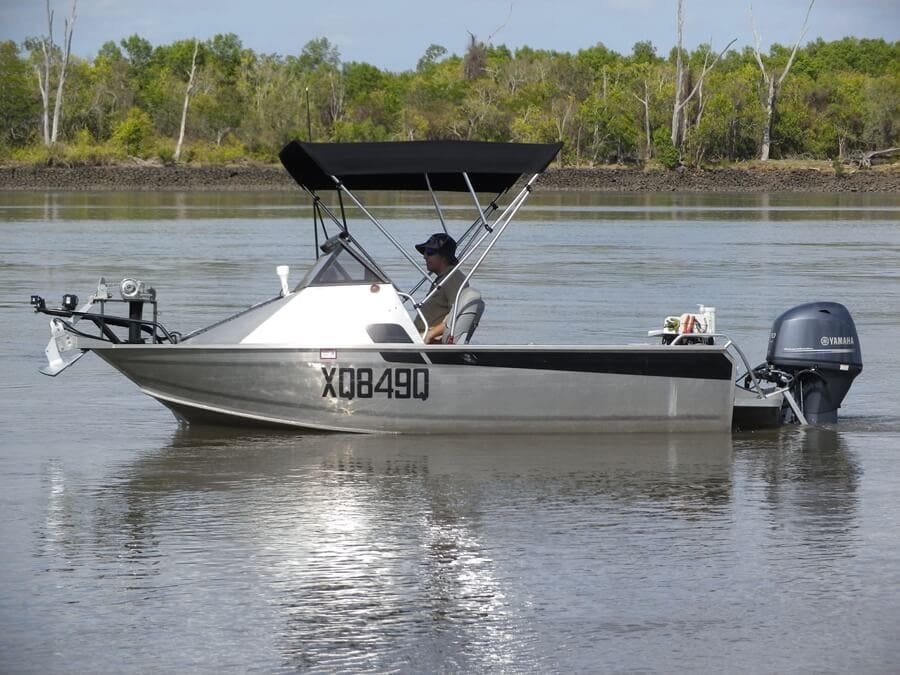
Always apply the one third fuel rule
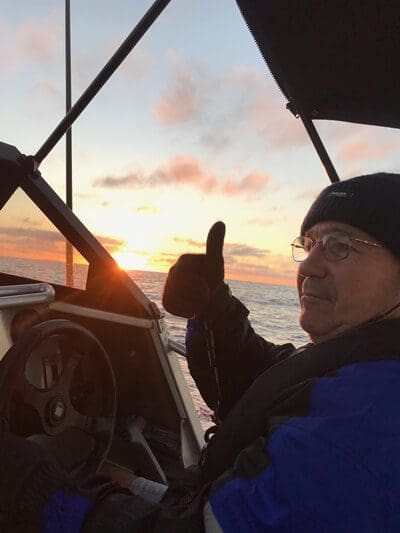
I love getting out on the water
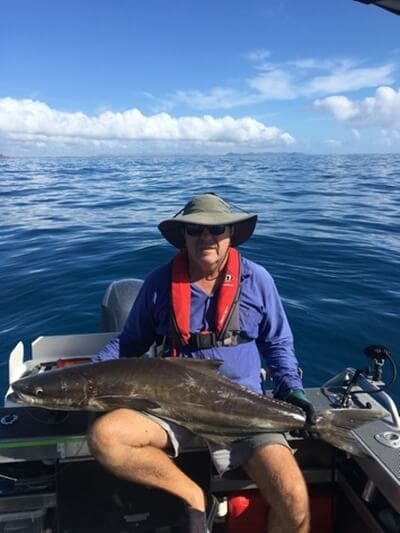
GPS makes it safer at sea
Geoff Ryder
Myself and 3 mates headed out from the Townsville coast guard ramp for a night of fishing. we had planned to head over to Cape Cleveland and out past to the offshore shoals.
We checked into the coast guard and got the latest weather forecast for the night and we logged in a trip sheet before we departed. the weather report was sweet with calm seas and 5knot winds forecasted. the boat we had was a large western Australian built dassan 7.5mtr plate alloy boat with a 200hp motor, which is a great safe ocean boat for reef and offshore fishing. We departed the coast guard ramp and When we got close to the cape I started to have trouble with my GPS unit, so I decided not to head out past the cape as I could not bring up the marks that I wanted to fish. We decided to stay at the cape for the night and fish the cape tip for fingermark etc. A couple of hours had passed when we noticed the winds suddenly increasing and the sea getting a small chop on it. Within the next 10 mins, it blew a gale with a strong squall hitting us with very heavy rain and then the seas getting quite large and with big waves coming from Maggie island direction.
I got one of my mates to pull anchor and I started to head into the waves so I could get away from the rocks at the cape. I was not in any danger at that time but my mates were getting a bit nervous. The rain was that heavy we could hardly see the lighthouse behind us even though we were only a few hundred meters from the cape. I noticed a couple of small tinnies were getting into trouble as these vessels were right beside us fishing before the storm blew up. I told my mates that I am going to turn around and go back to help them as I couldn’t leave them behind without knowing that they were ok. when I turned I knew we were going to cop a big wave from the side but I had full faith in the boat.
A big wave hit us on the starboard side and came over the boat washing the anchor and rope out of the anchor storage well. the anchor rope went under the boat and got tangled in the prop and stalled the motor, now I was dead in the water and a little worried myself. i told one of my mates to get on the phone and call the coast guard I also radio contacted them as well. i instructed everyone to put on the life jackets and to stay calm.
One of my mates was an ex fisheries officer from Western Australia and I told him to grab the flares and EPIRB and have ready. We were drifting back close to the rocks at the cape tip and I was getting concerned that we may get washed up onto the rocks so I told everyone we may have to abandon ship if we get to that situation.one of my mates could not swim so I told him to grab some rope I had on board and I would tie myself to him to help him if needed. My other mate (the ex fisheries officer) was really starting to panic by this time to my surprise and I had to settle him down with some very stern words. We drifted past the cape and out of harms way much to a lot of cheers from everyone. we took another wave over the back of the boat which flooded the batteries and made all of our electric’s fail so all we had was a couple of torches which we used to try and make contact with the other boats that were near us. the storm only lasted about 20 minutes and we bailed the water out of the boat and we were drifting out to open ocean. the other boats that were near us were safe and we tried to contact them with flashing a sos at them to come and help us but to our surprise and disgust, they just went past us and left us to fend for ourselves.
After an hour had passed the coast guard boat was on its way and when they arrived they pulled up beside us to ask us if we were ok. They told us they had other boats sinking out at keeper reef from the storm and told us we just had to wait it out. I told them we found and we were floating and everything would be ok with us. I contacted a mate that was at alligator creek and he said he would come out and tow us back in so all was sweet by the time my mate had got to us we had all of our electric’s back on the boat but to get the rope untangled from prop it required someone to get in the water. the seas were still quite lumpy so this wasn’t a good idea at the time, so they towed us back to the cape were we got the motor going again.
We headed off back to Townsville and arrived back at the coast guard ramp about 3 am in the morning. I went into the coast guard office which they were there having a busy time trying to coordinate various rescues that were happening that night .i logged of my trip sheet and I asked them about the weather forecast that the bom site had released for that night and they were as shocked as I was with the poor forecast. Anyway, all was well and we got back safe and sound, but my mate the ex fisheries officer has vowed never to return to sea again and he offered me all of his fishing gear at a very reasonable price ha. It ended to be a very bad storm that night with the loss of a couple of boats and I think a boat being washed up onto a beach at palm island and a person breaking his leg. Anyway, some good lesson’s were learnt and one that I have always known and that is to never underestimate the power of the sea and always have respect
for it and be ready for when a surprise storm hits you.
Is interpreting your sounder a challenge? Perhaps you have trouble identifying fish? Our $20 Sounder Skills 1 course will help!
Click the button below to get started. It’s cheap as a takeaway lunch at the moment and only takes about 40 minutes to
watch. Also includes (as a free bonus) our sounder interpretation presentation.
Stop scratching your head and start catching fish in less time using my knowledge.




